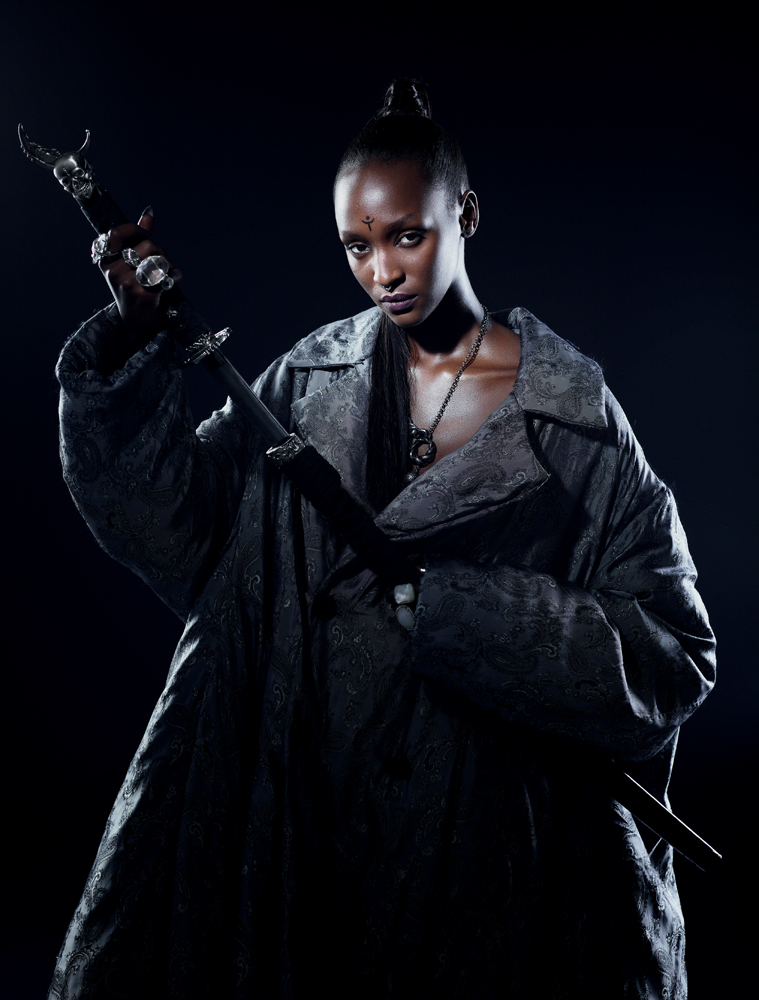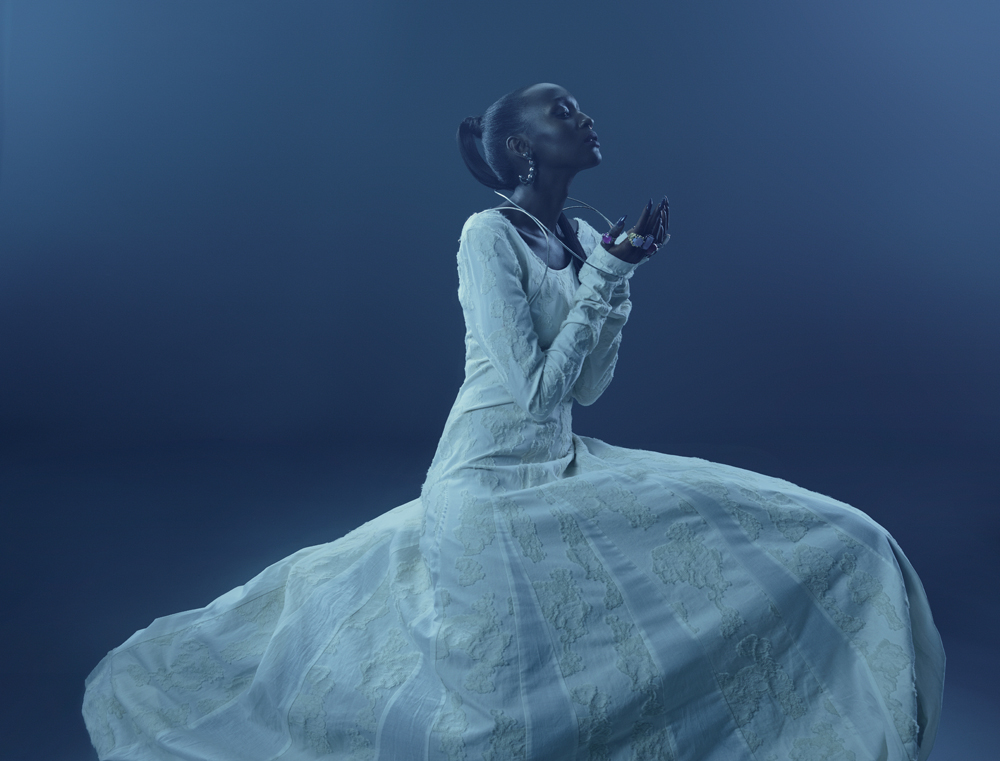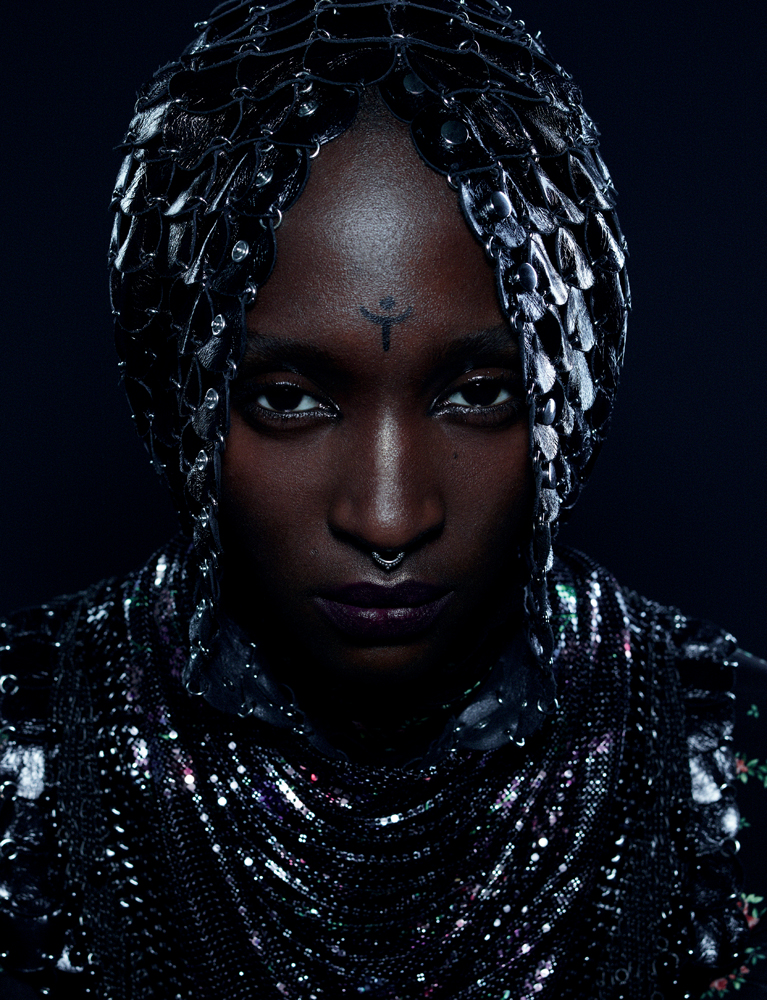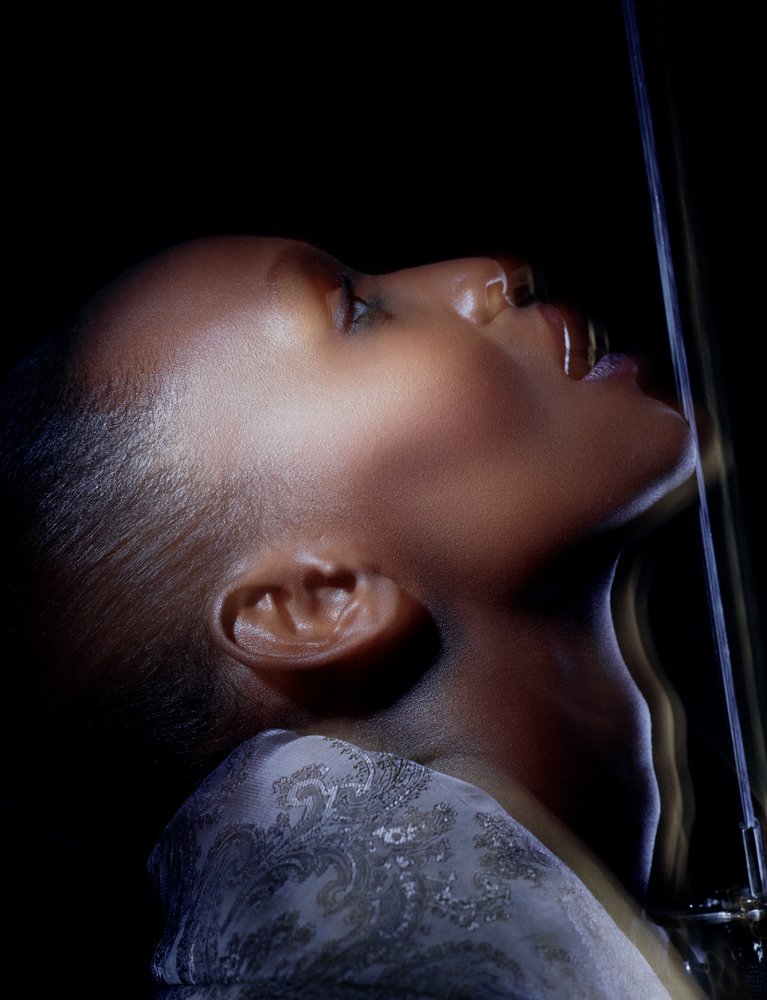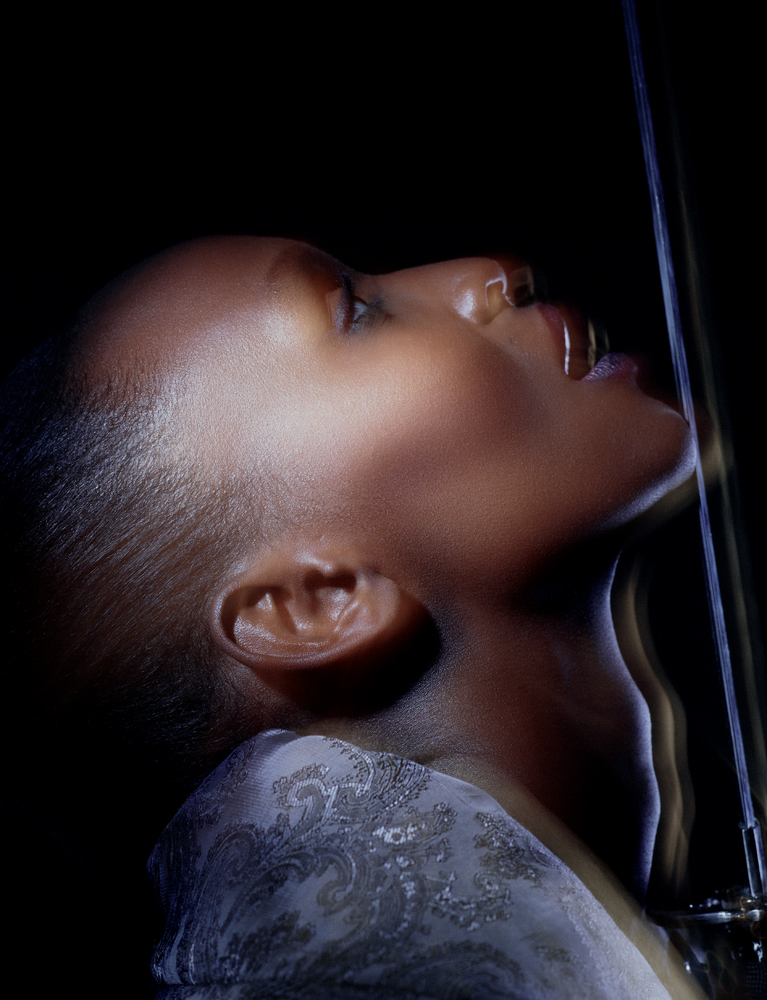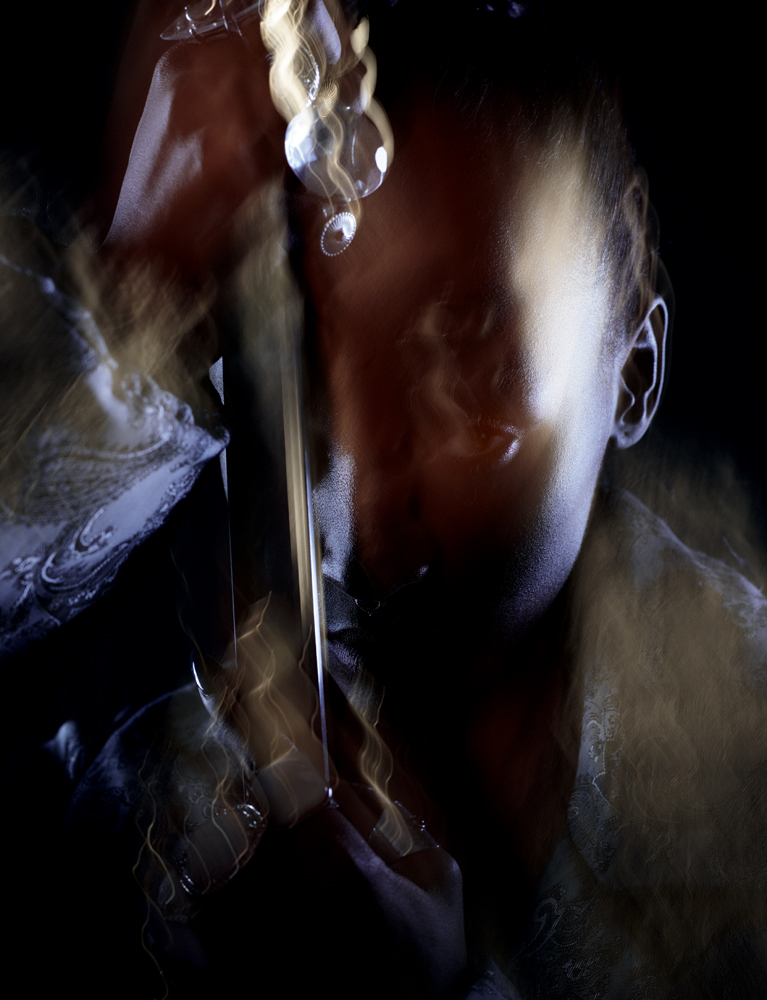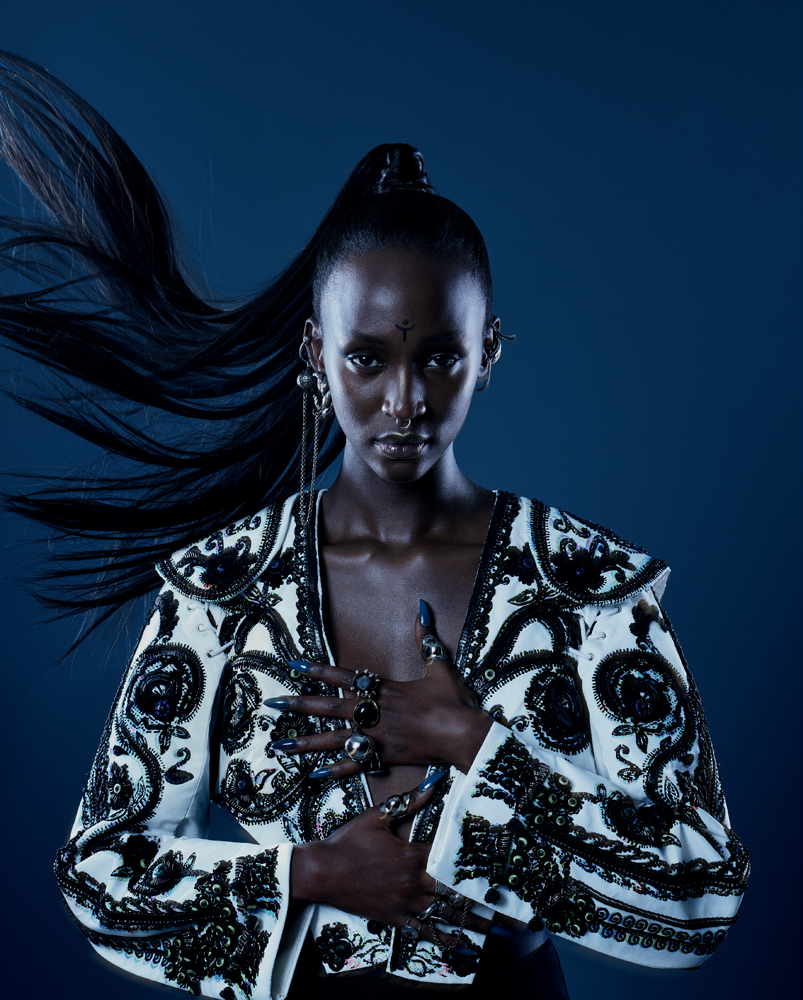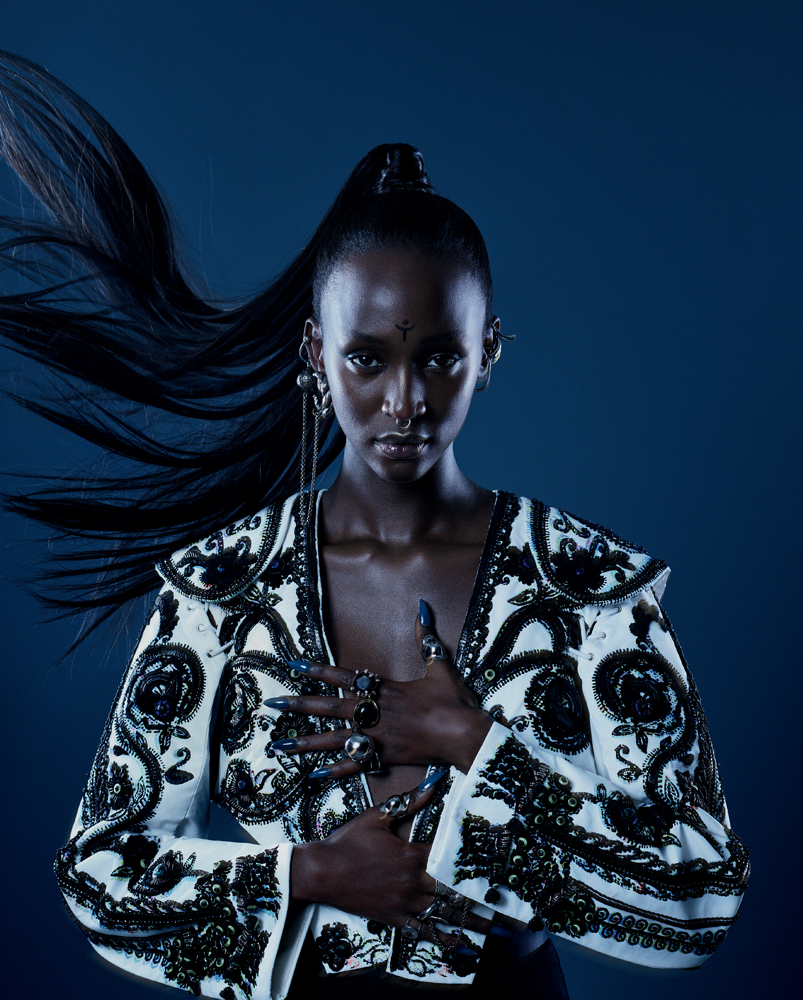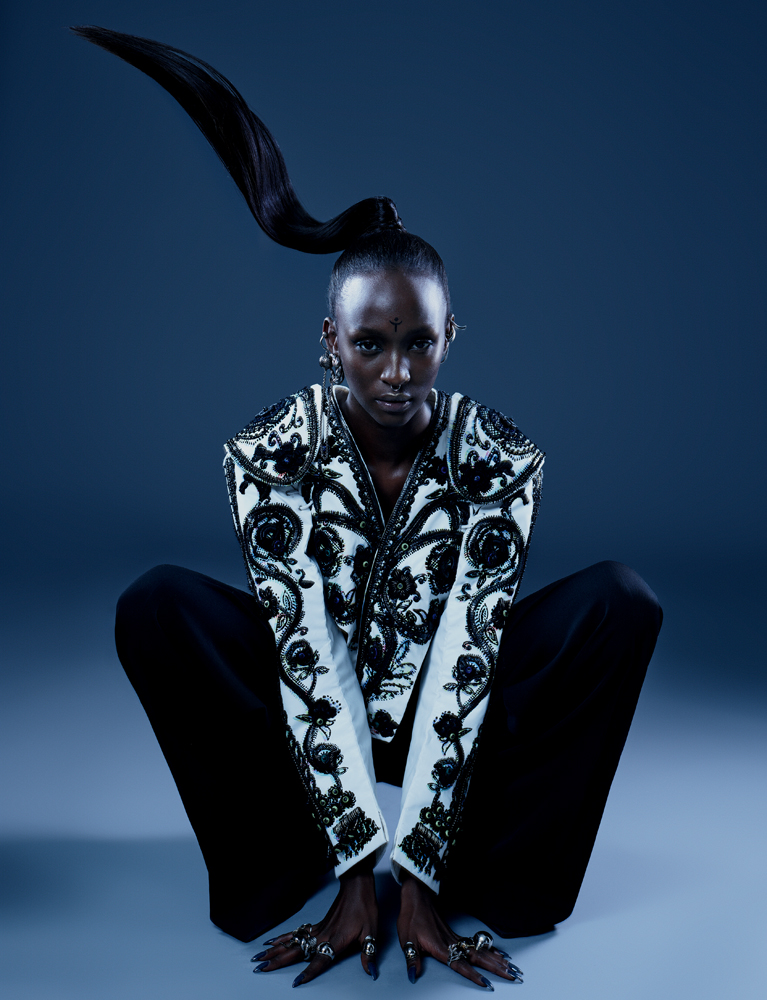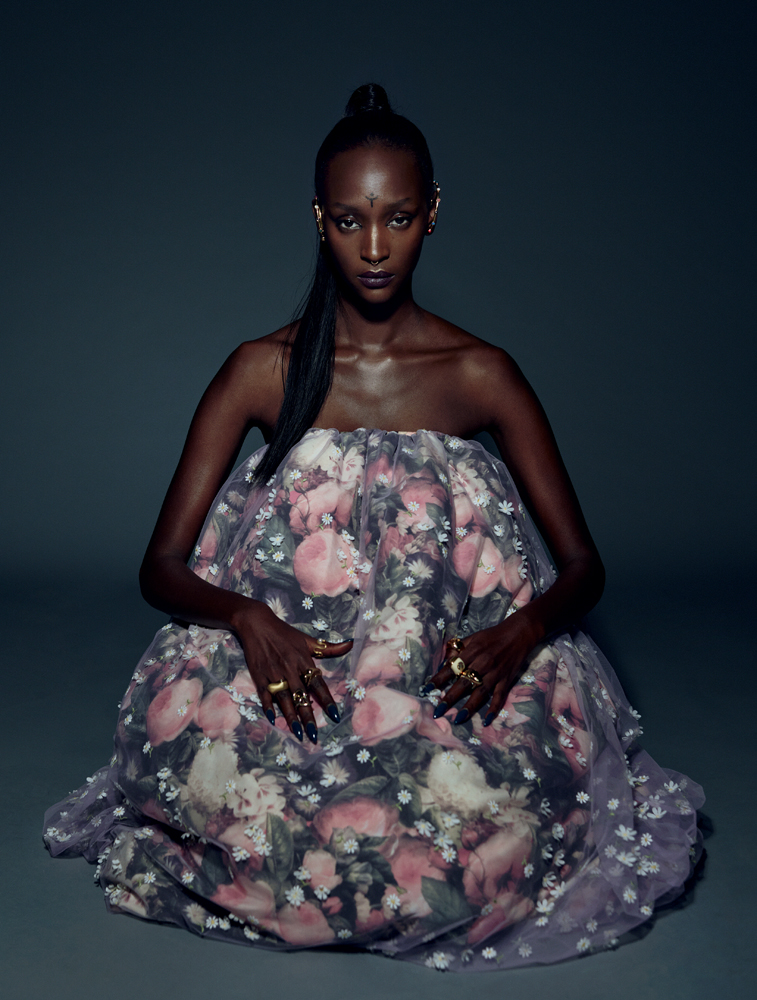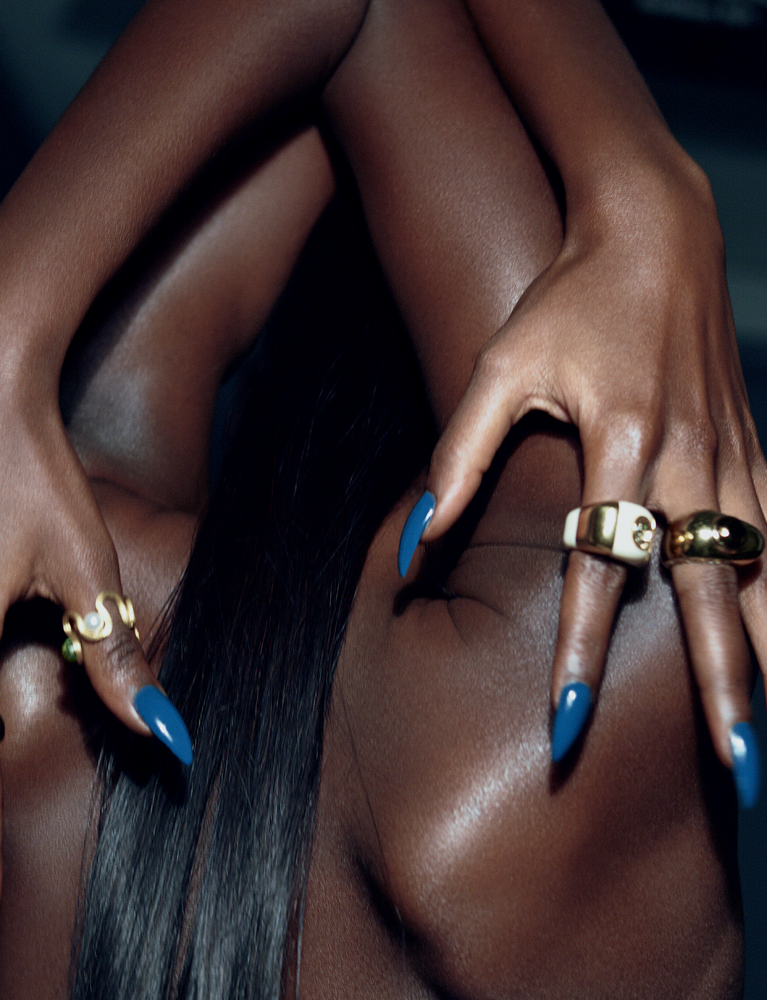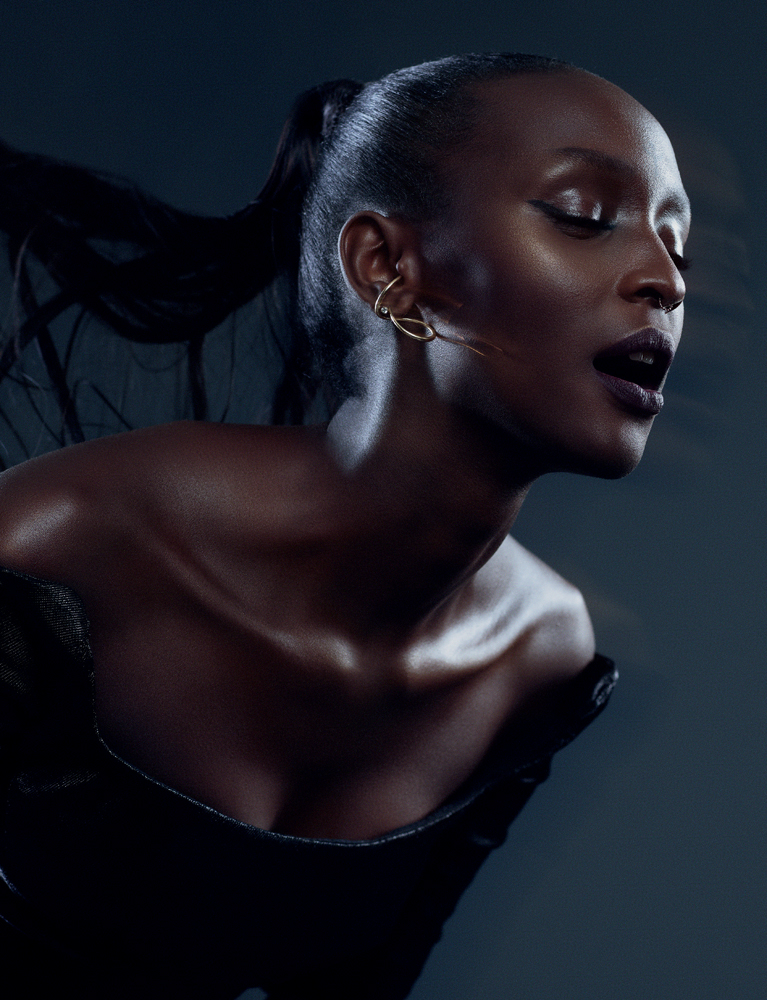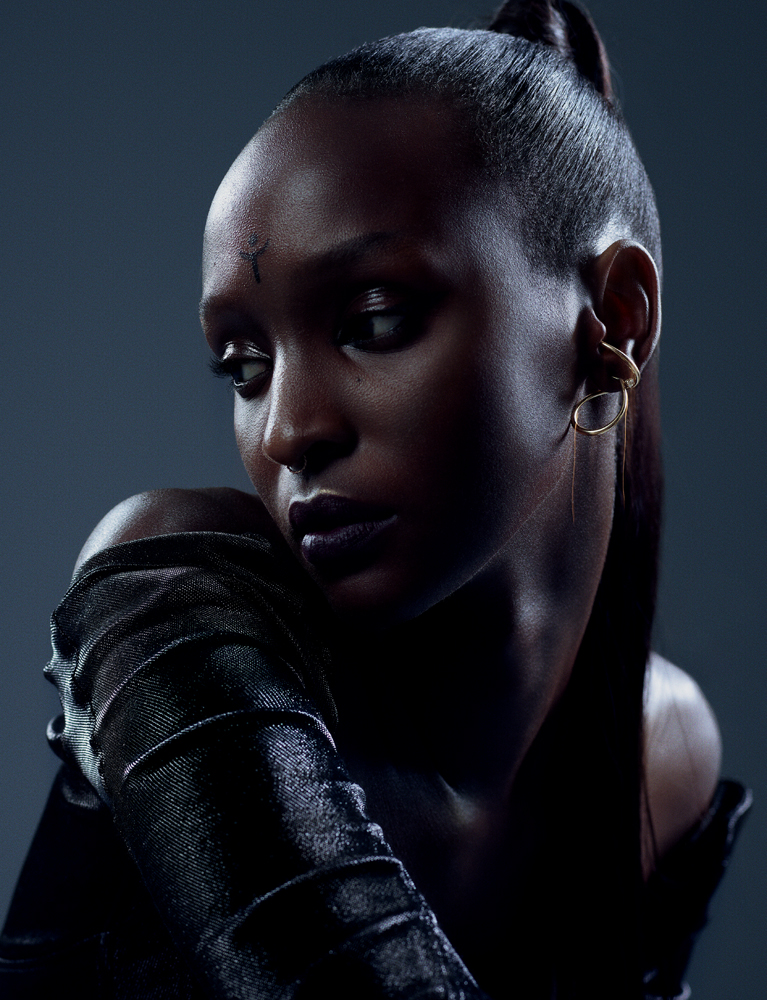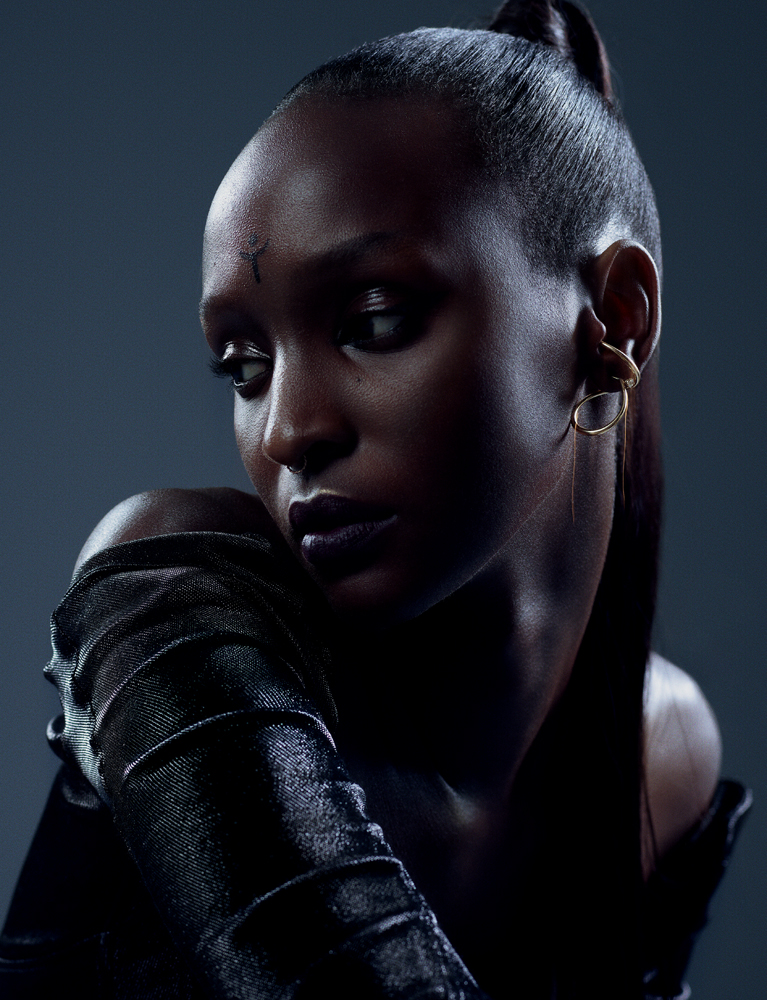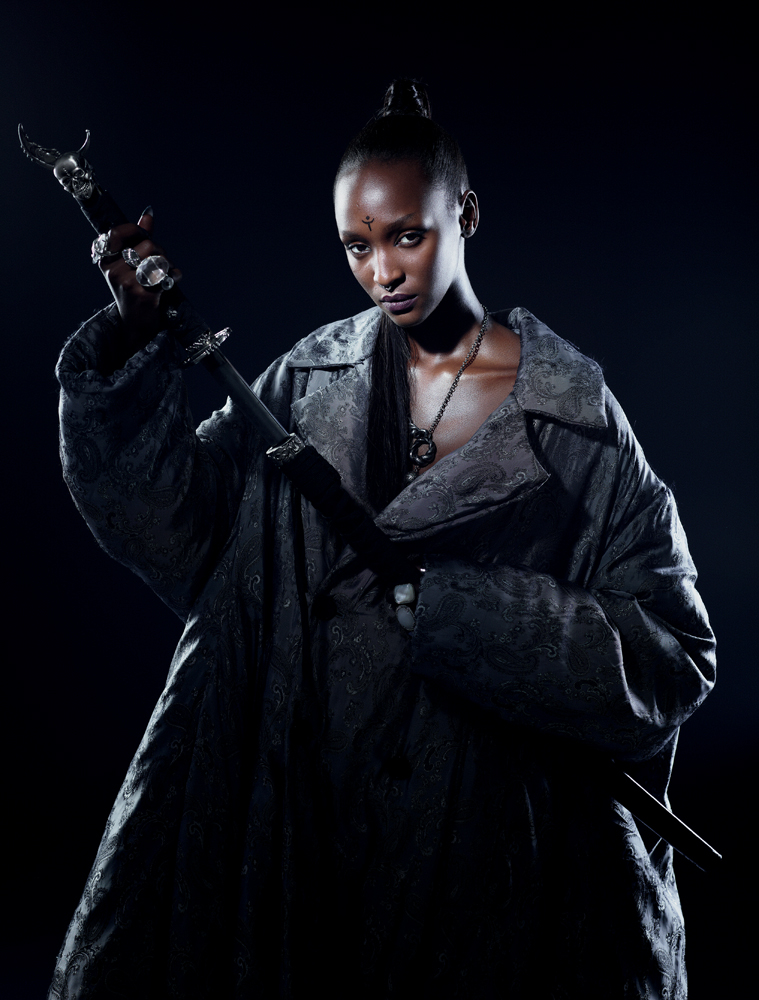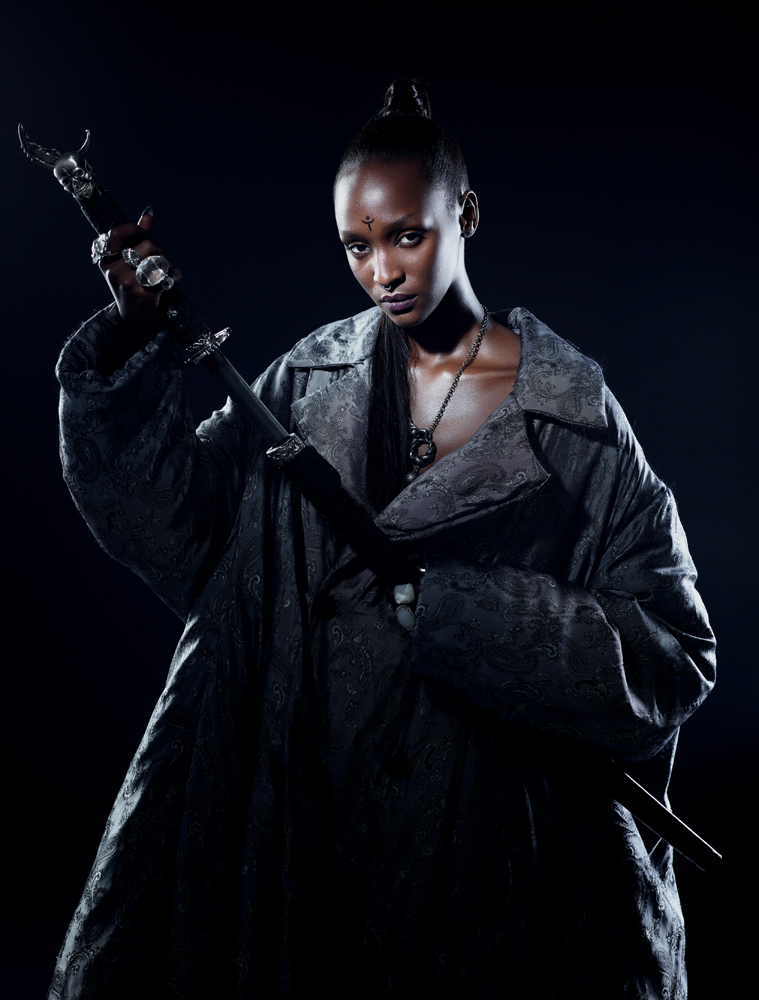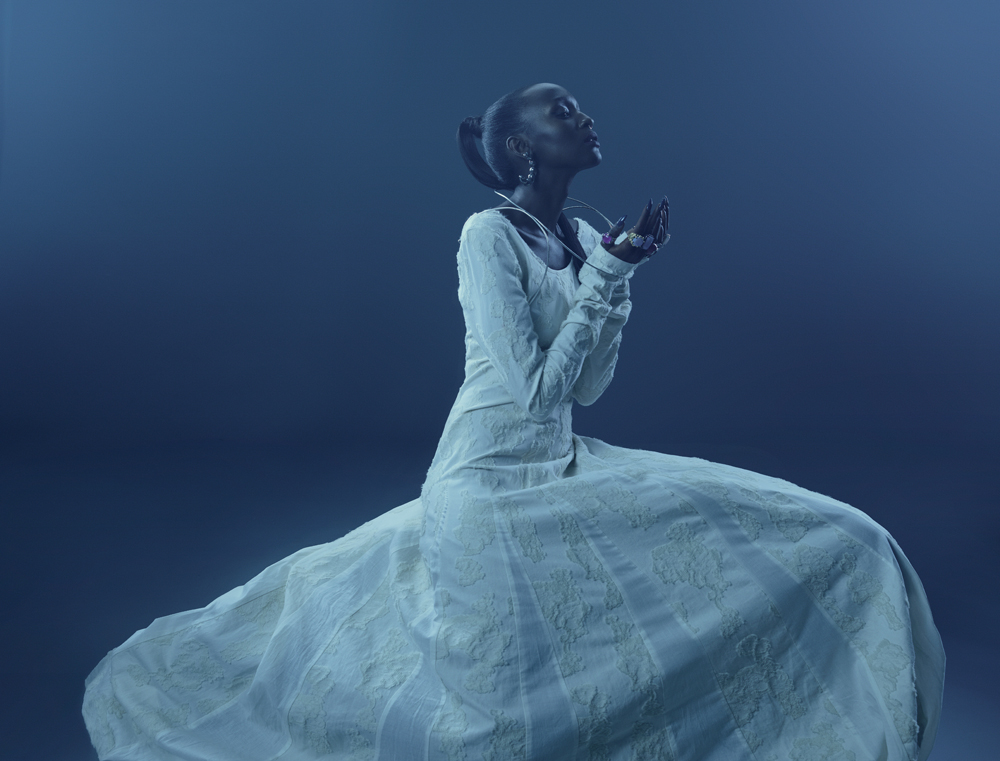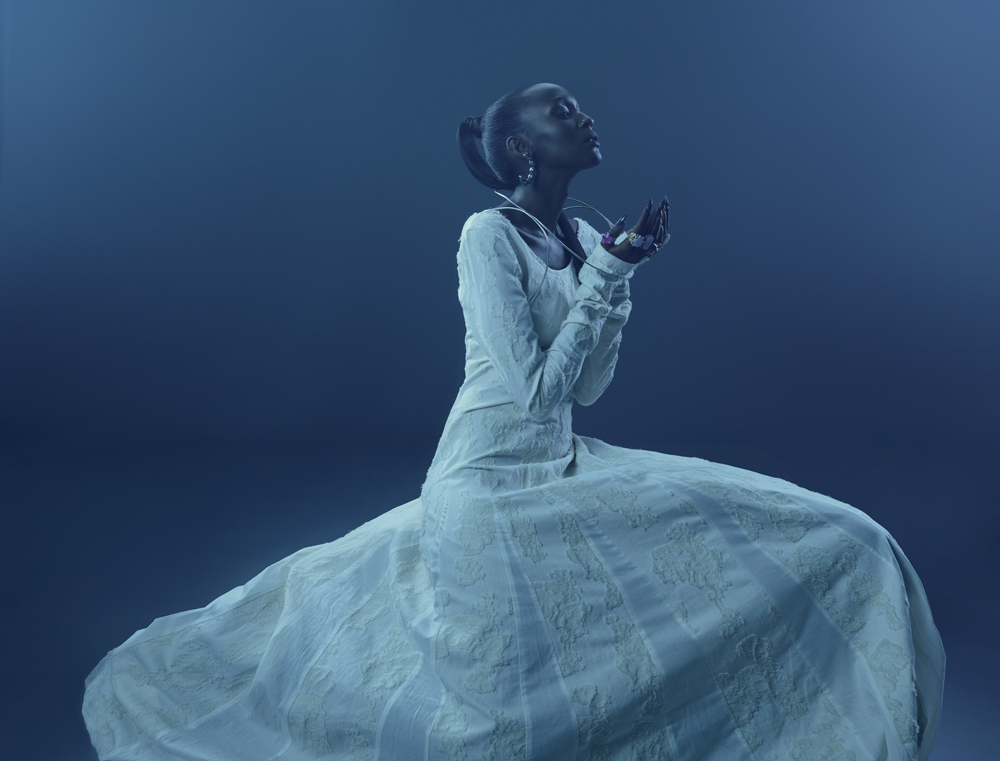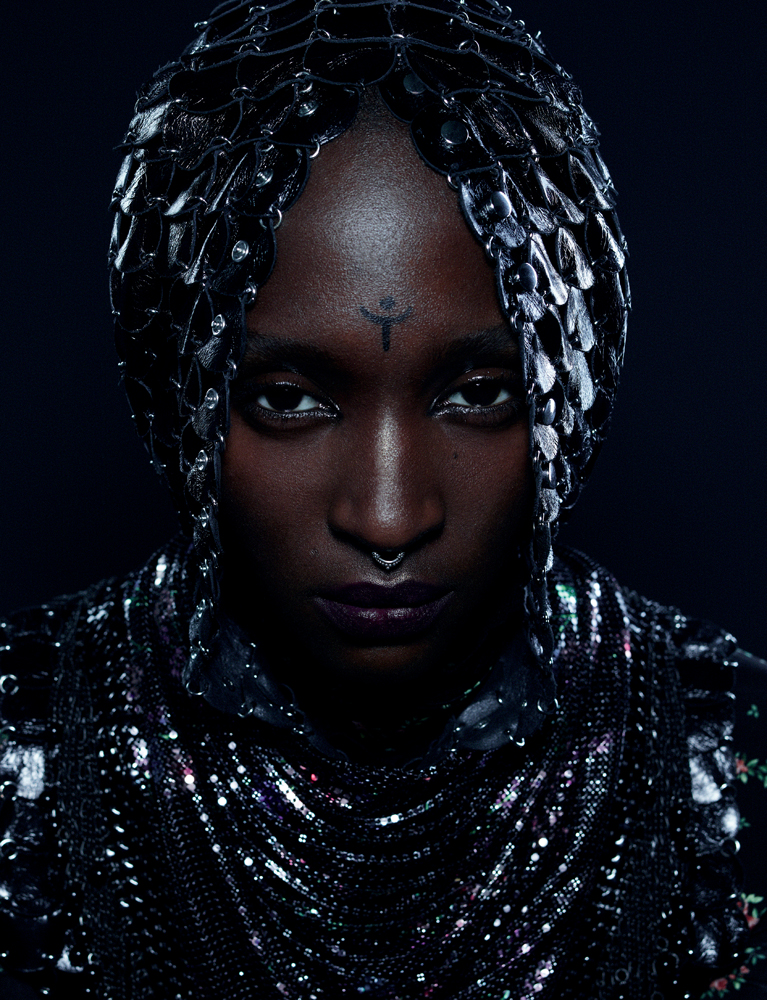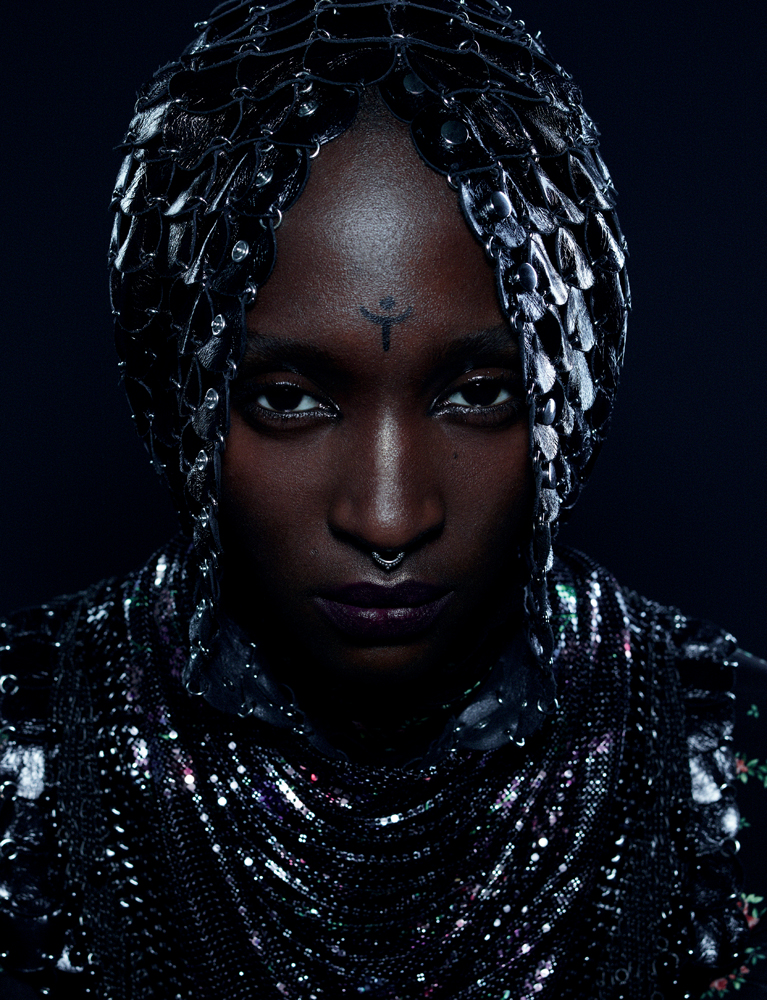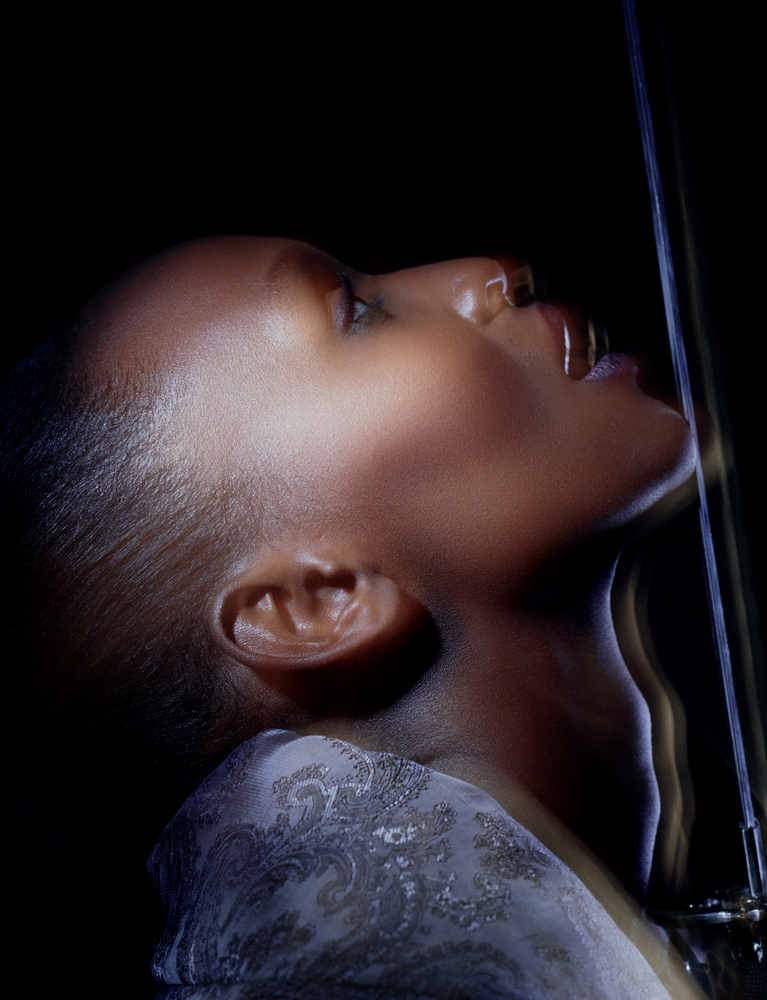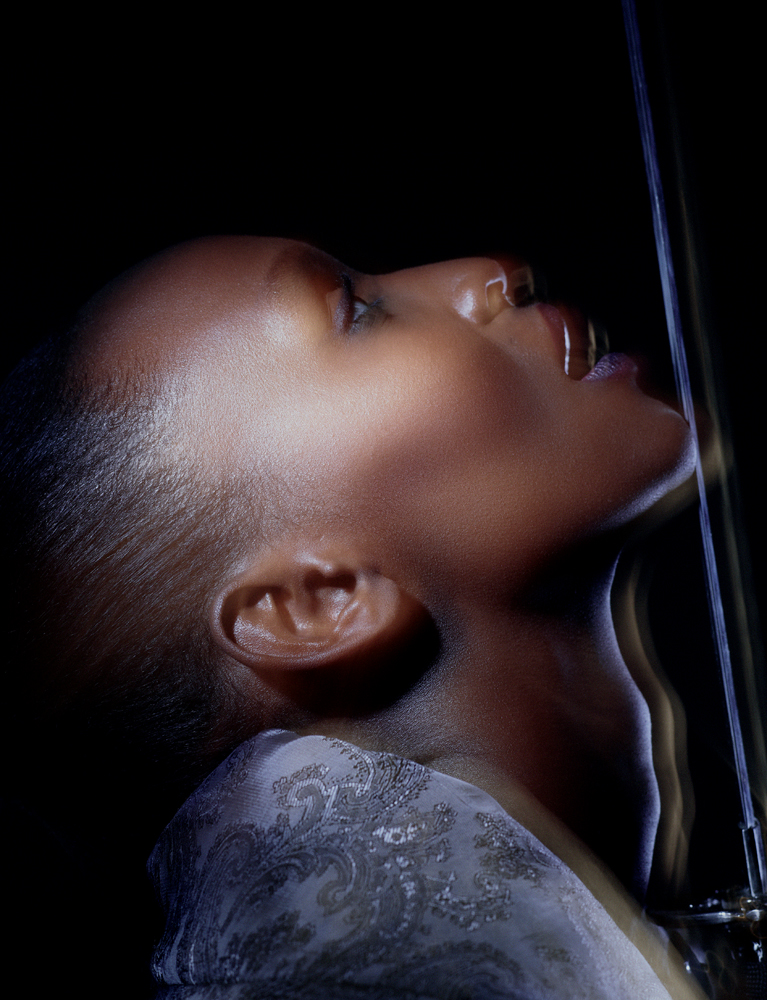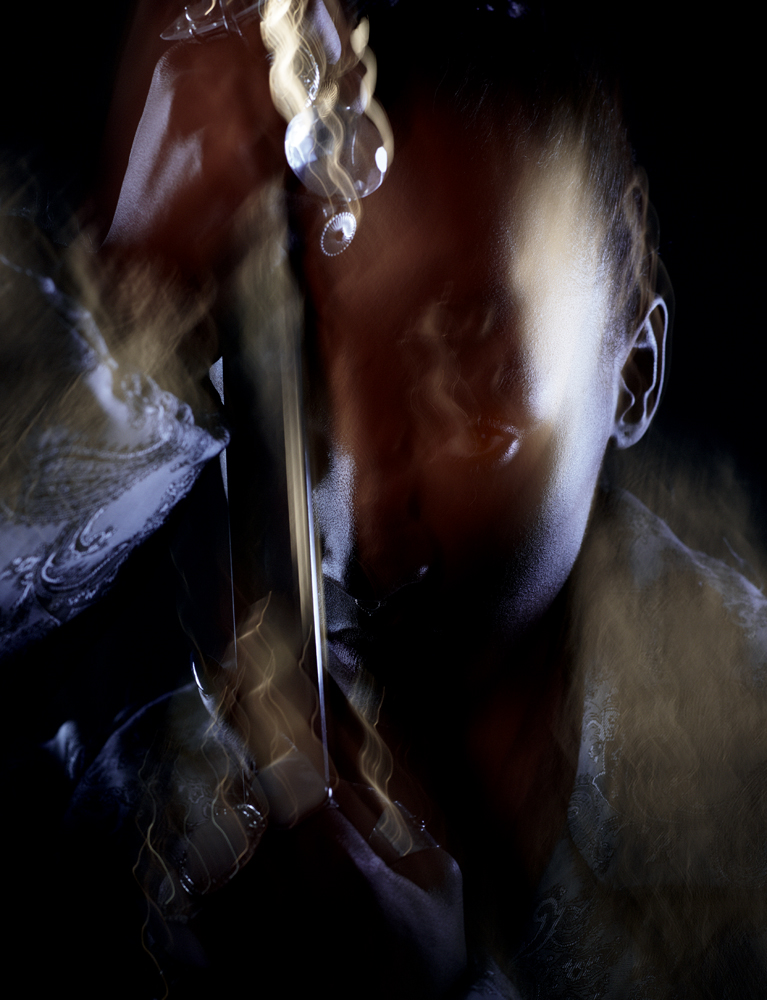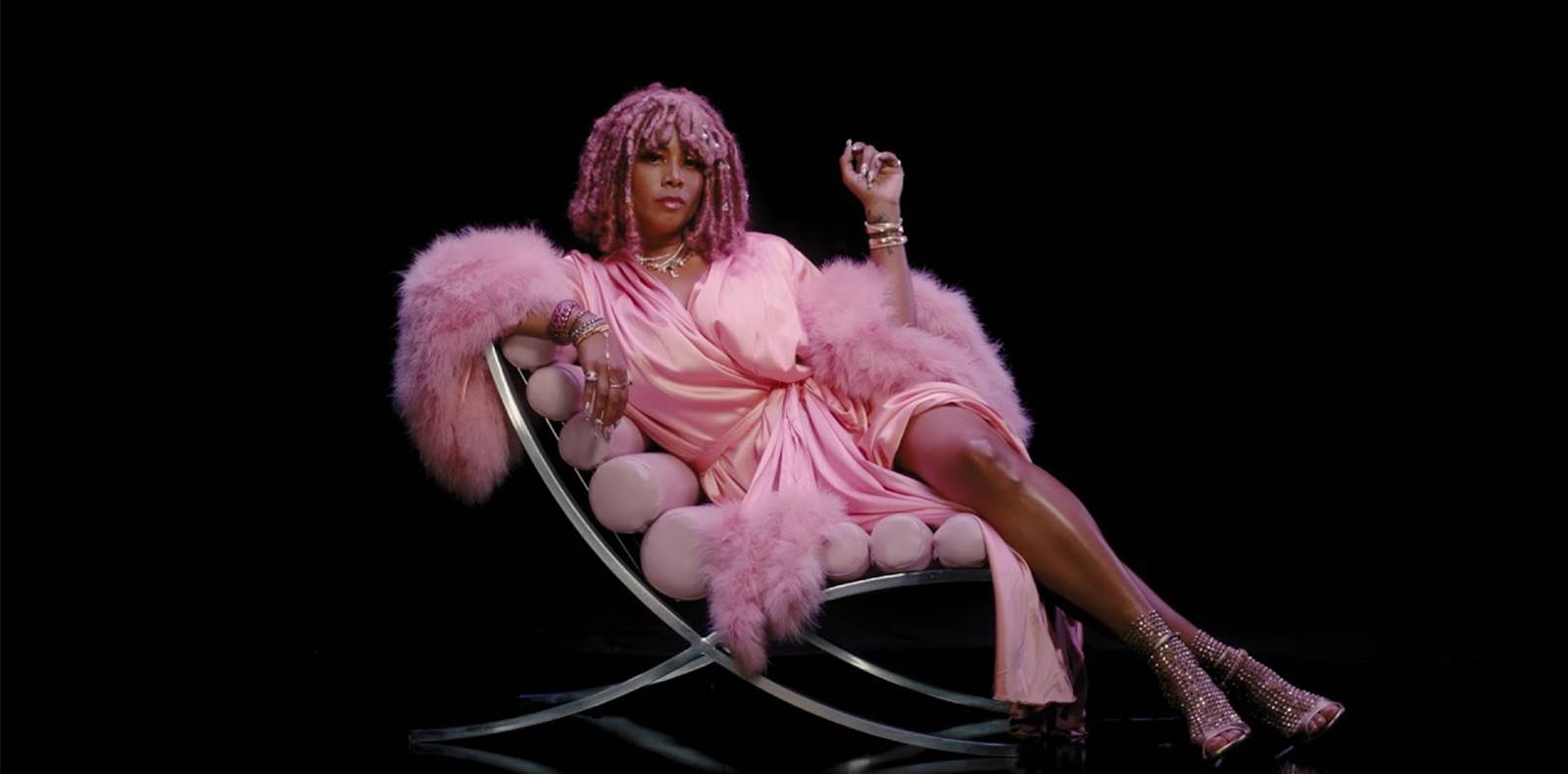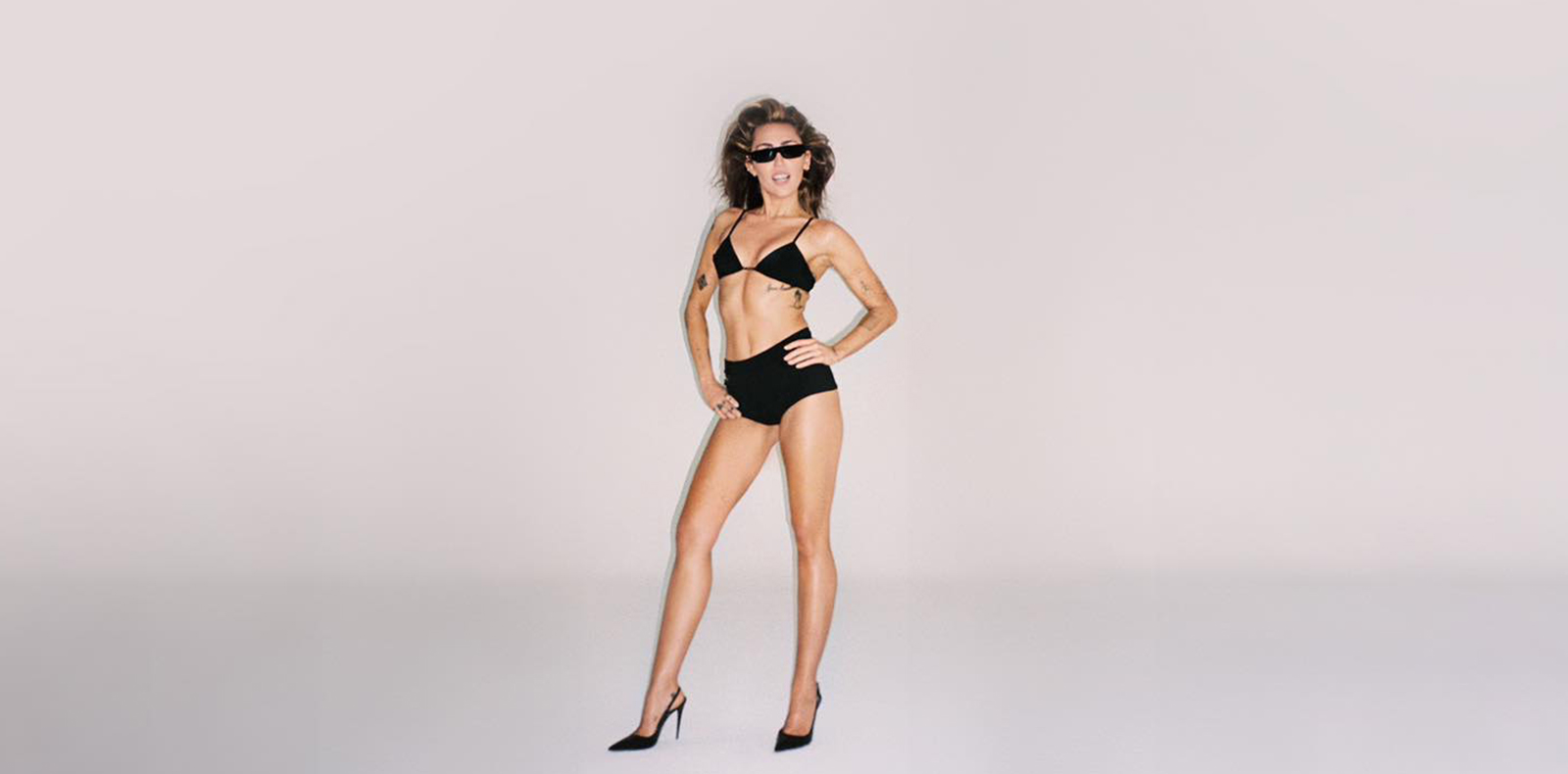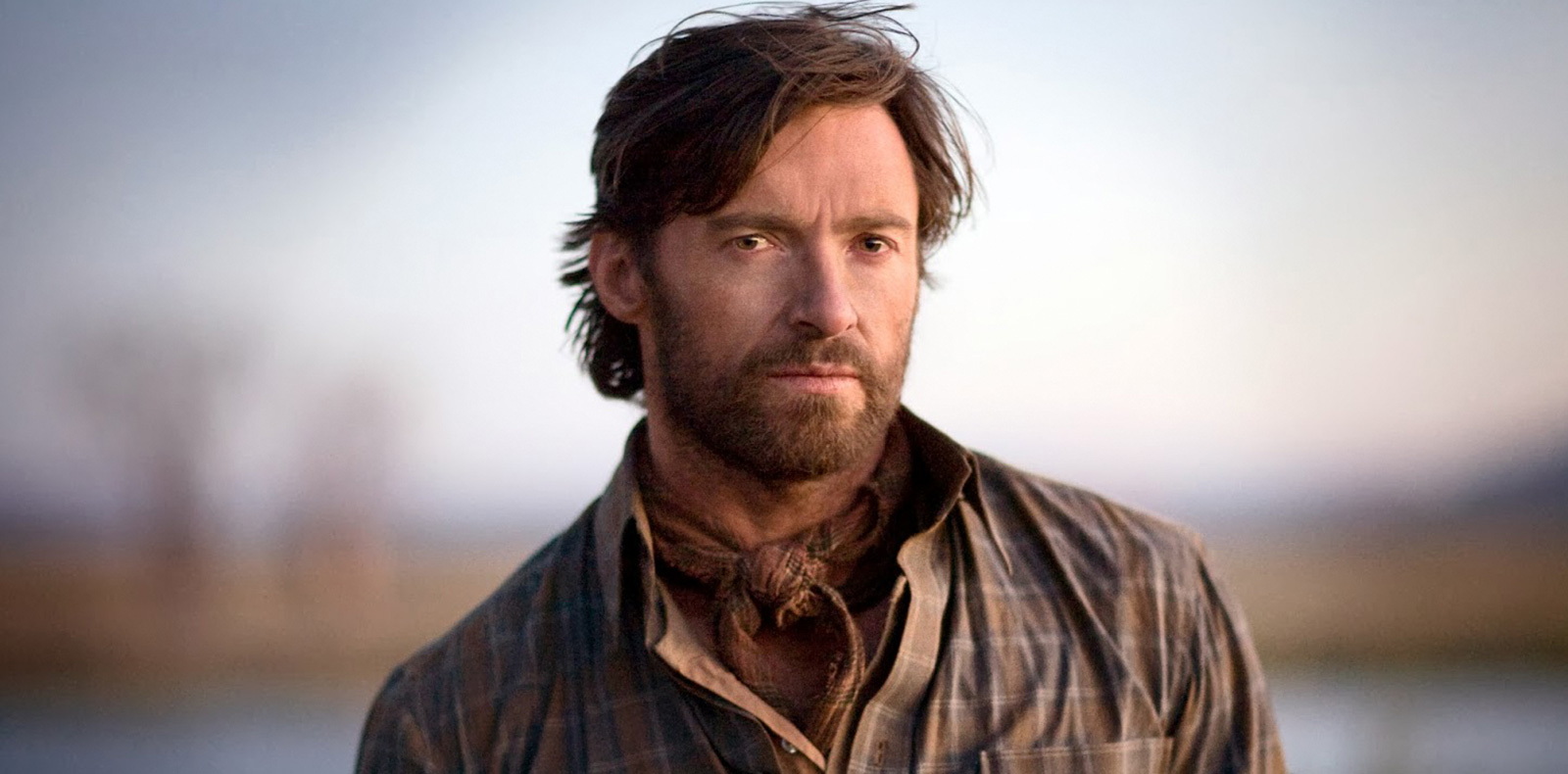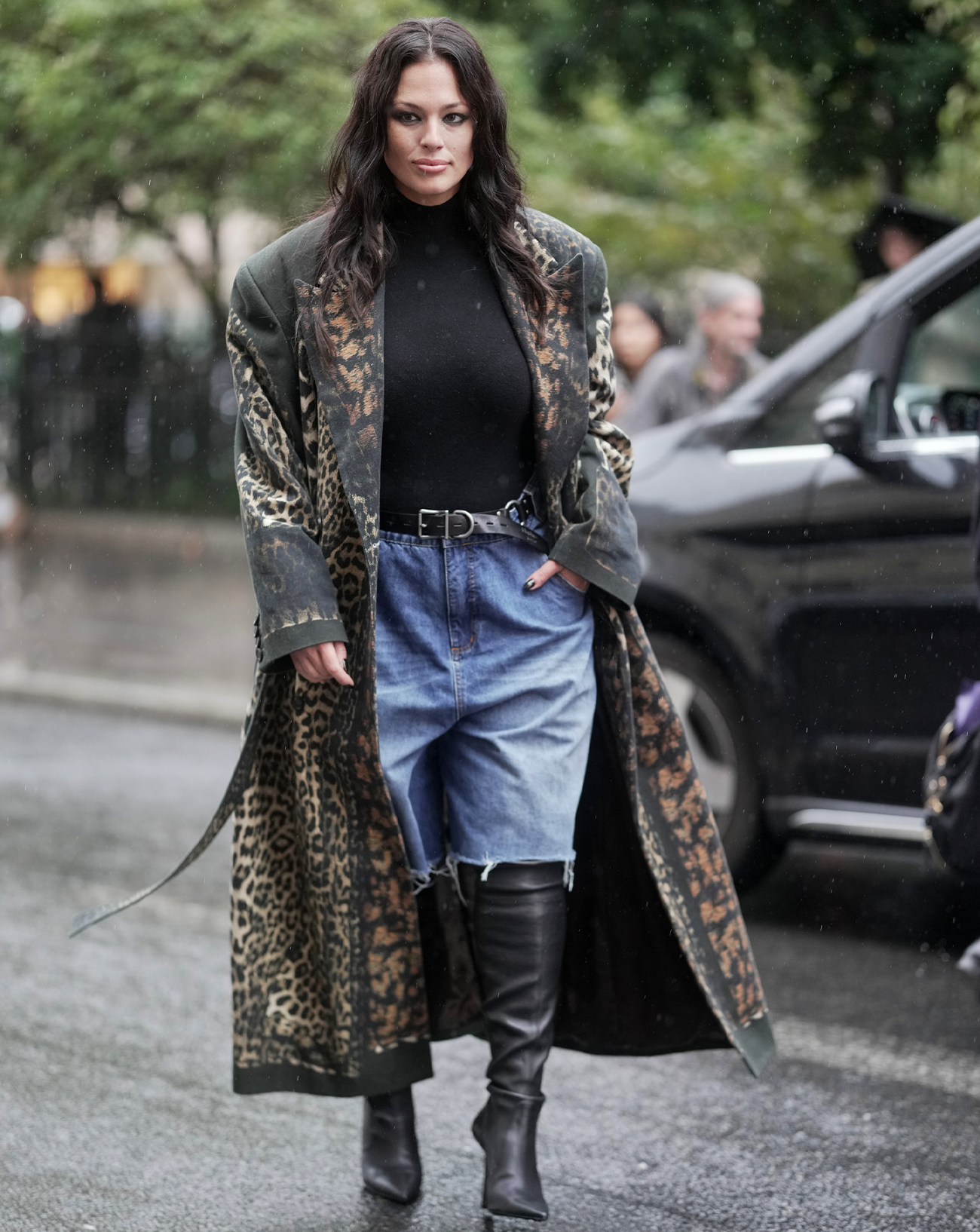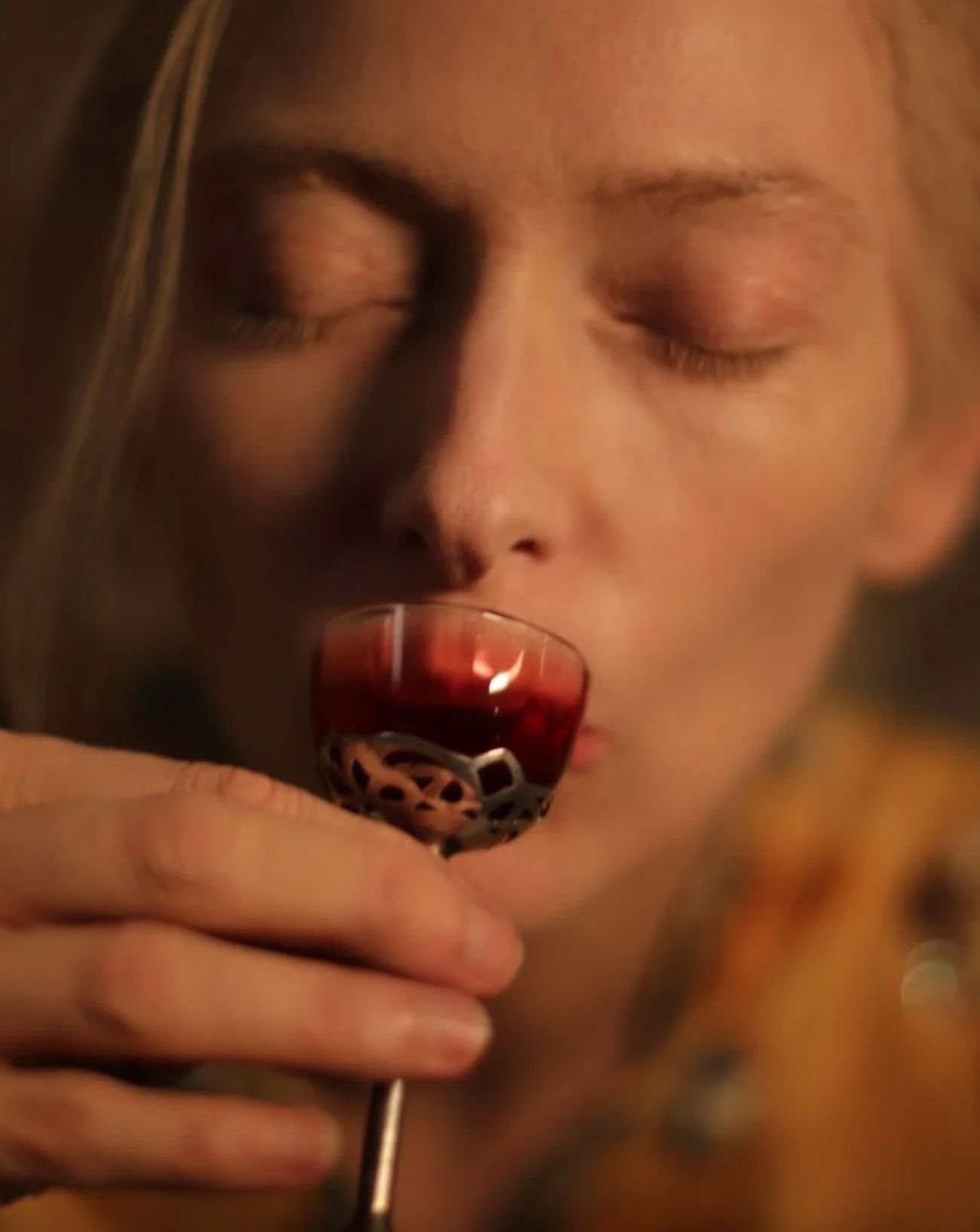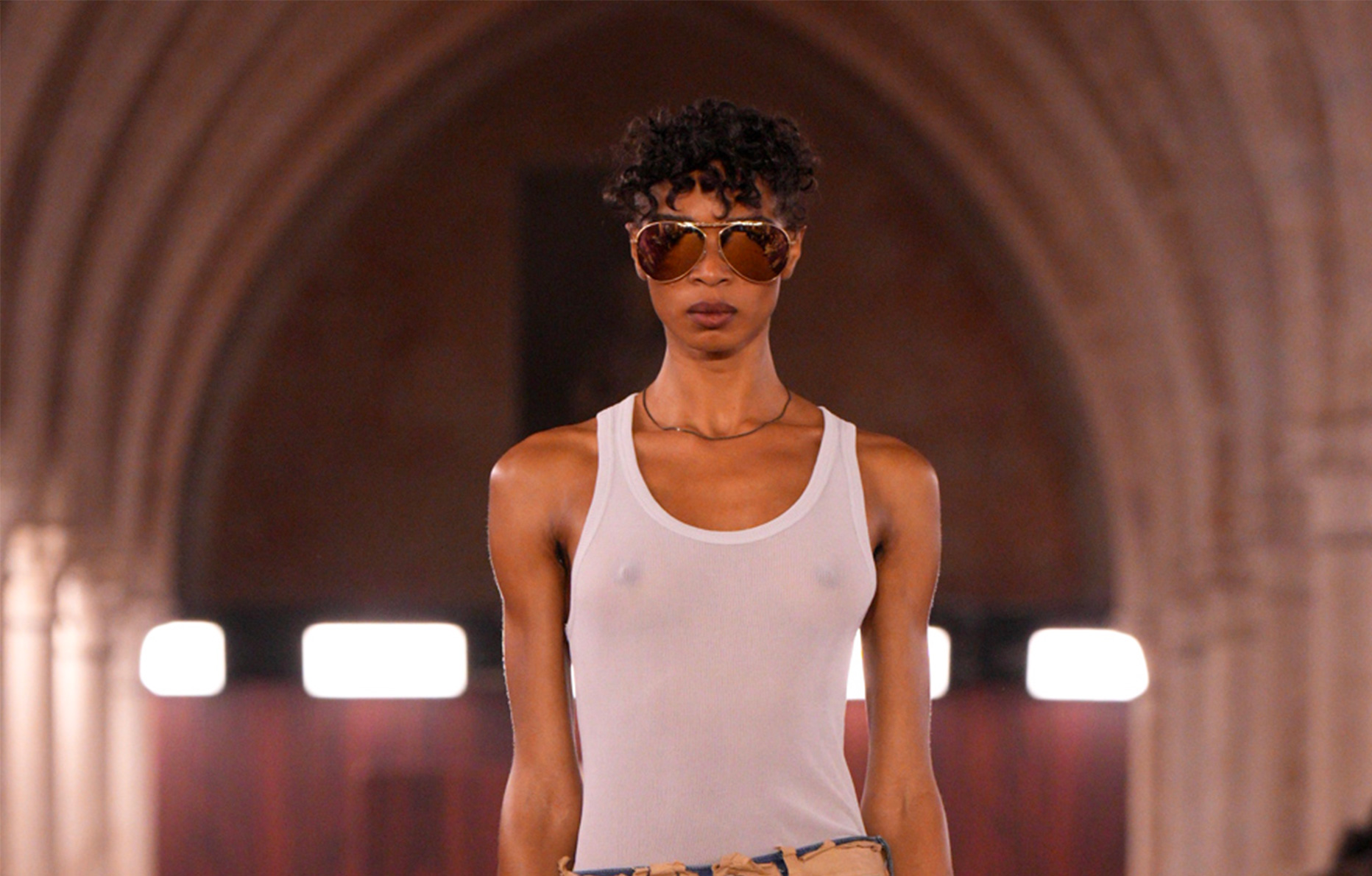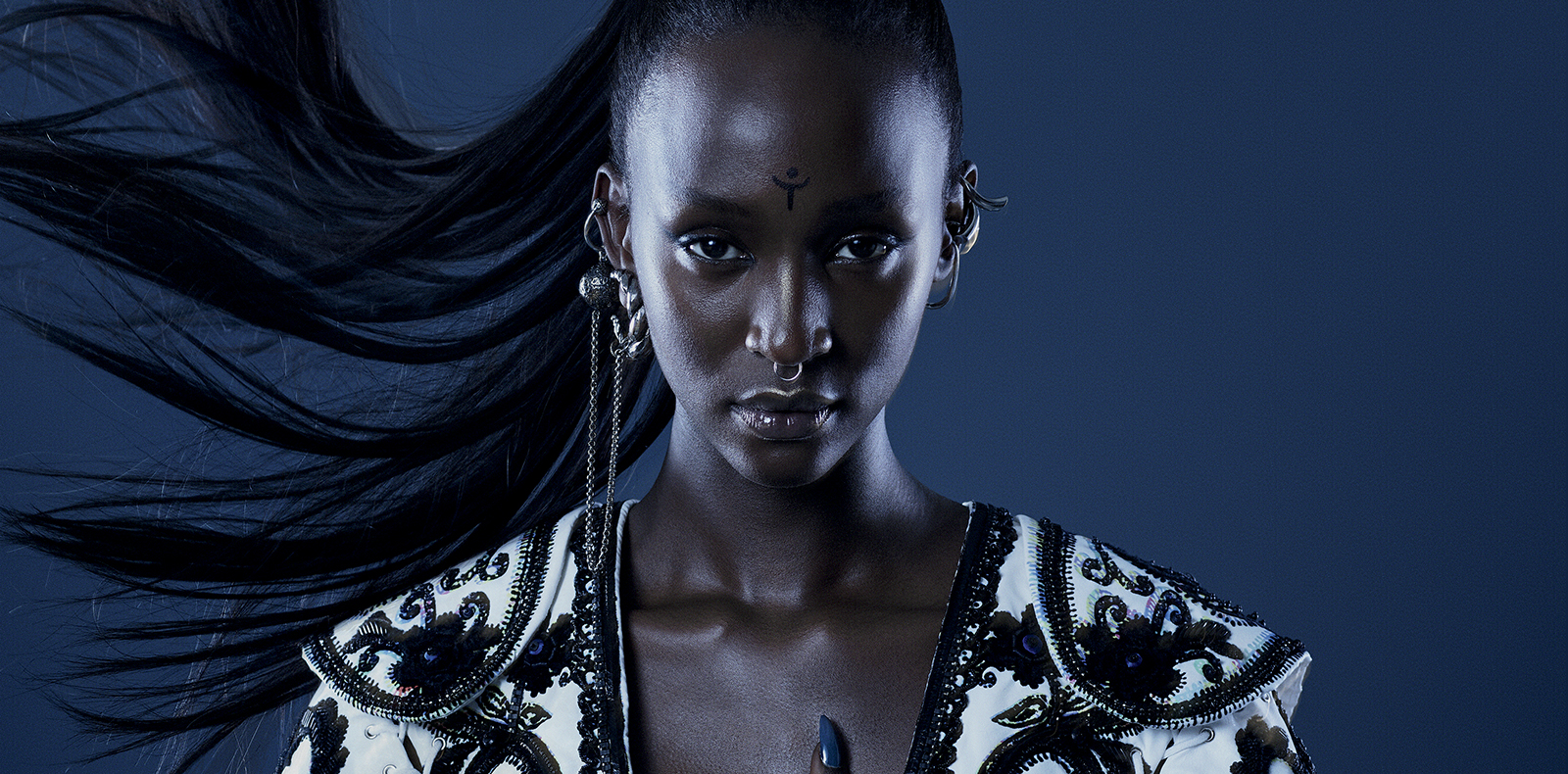
9
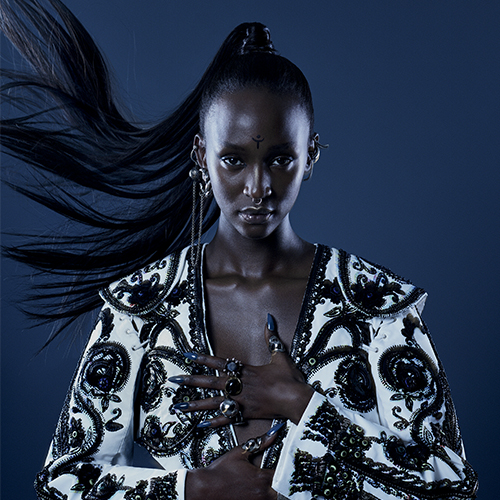
9
Interview with Lous and the Yakuza : “I talk about rape, prostitution, loneliness, colonialism.”
Combining musical talent with the beauty and elegance of a queen, Lous and the Yakuza caught the world’s attention with her very first single, Dilemme, which came out in 2019. Marrying hip-hop rhythms with pop melodies, the young Belgian singer of Congolese origin appeared remarkably assured, an impression magnified by the sophisticated art direction in the accompanying video. A few months later, Lous and the Yakuza confirmed her star potential with Gore, her first album, whose critical success has seen her hailed by the fashion world – Chloé has chosen the singer for one of its campaigns, while Louis Vuitton invited her to walk the runways in October – and has set her on a path straight to the firmament.
Photographie : Colin Solal Cardo,
Propos recueillis par : Lucas Aubry,
Réalisation : Elena Mottola.
Numéro: Your first album, Gore, came out in October this year, right in the middle of the health crisis. Were you worried that world events would harm the beginning of your career?
Lous and The Yakuza: No, because that’s life. That’s how things were meant to happen. I believe very strongly in god, so I also believe in destiny. I tell myself that it was written in the stars. It’s an extra obstacle, but it doesn’t matter. What does matter is this pandemic, not my album coming out in the middle of it. In a way, I think it makes me tougher.
Barely had you made your début than you were being listened to by millions on streaming and were honoured with an appearance on Jimmy Fallon’s The Tonight Show in the US. How do you feel about this planetary success?
Being on The Tonight Show was crazy! I was very surprised and honoured to be invited. What’s more, the audience over there is truly interested in music, you don’t have to shorten your performance for TV. But success is just a side effect of my dream, which was to become a singer. Fame doesn’t really interest me. I like quiet, I like the countryside, even if I realize that my videos don’t necessarily show that image of me…
It’s true, you come across as very haughty and intimidating in your videos, but in real life you seem much more approachable.
I am a multitude of people. Perhaps later this afternoon I’ll be wearing an orange wig, high heels and have drawings all over my face. I simply follow the course of my desires. In my videos it’s my responsibility to give an excellent image of the Black woman. I believe I represent the excellence of the Black woman as my natural self, but unfortunately no one else is going to understand that. So I find myself obliged to find a way of showing a beauty that will more easily impress others.
It’s true that Lous and the Yakuza isn’t just the music but also a very strong visual identity.
I must admit that I’m a control freak, I want to decide everything that the audience sees of me – my nails, my hair, the lighting in my videos, the camera angles… I prepare everything in advance, absolutely everything. With, each time, a precise idea in my mind. A lot of artists have stopped making that kind of effort. As well as being complicated to listen to, their productions are complicated to watch.
Numéro: Your first album, Gore, came out in October this year, right in the middle of the health crisis. Were you worried that world events would harm the beginning of your career?
Lous and The Yakuza: No, because that’s life. That’s how things were meant to happen. I believe very strongly in god, so I also believe in destiny. I tell myself that it was written in the stars. It’s an extra obstacle, but it doesn’t matter. What does matter is this pandemic, not my album coming out in the middle of it. In a way, I think it makes me tougher.
Barely had you made your début than you were being listened to by millions on streaming and were honoured with an appearance on Jimmy Fallon’s The Tonight Show in the US. How do you feel about this planetary success?
Being on The Tonight Show was crazy! I was very surprised and honoured to be invited. What’s more, the audience over there is truly interested in music, you don’t have to shorten your performance for TV. But success is just a side effect of my dream, which was to become a singer. Fame doesn’t really interest me. I like quiet, I like the countryside, even if I realize that my videos don’t necessarily show that image of me…
It’s true, you come across as very haughty and intimidating in your videos, but in real life you seem much more approachable.
I am a multitude of people. Perhaps later this afternoon I’ll be wearing an orange wig, high heels and have drawings all over my face. I simply follow the course of my desires. In my videos it’s my responsibility to give an excellent image of the Black woman. I believe I represent the excellence of the Black woman as my natural self, but unfortunately no one else is going to understand that. So I find myself obliged to find a way of showing a beauty that will more easily impress others.
It’s true that Lous and the Yakuza isn’t just the music but also a very strong visual identity.
I must admit that I’m a control freak, I want to decide everything that the audience sees of me – my nails, my hair, the lighting in my videos, the camera angles… I prepare everything in advance, absolutely everything. With, each time, a precise idea in my mind. A lot of artists have stopped making that kind of effort. As well as being complicated to listen to, their productions are complicated to watch.
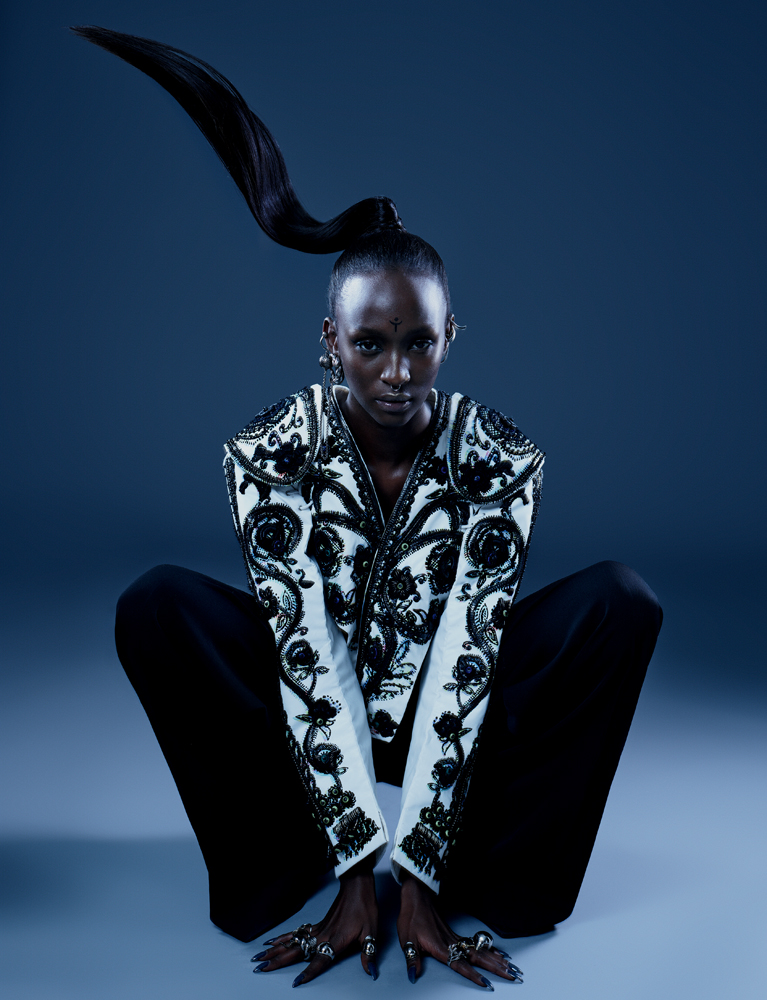
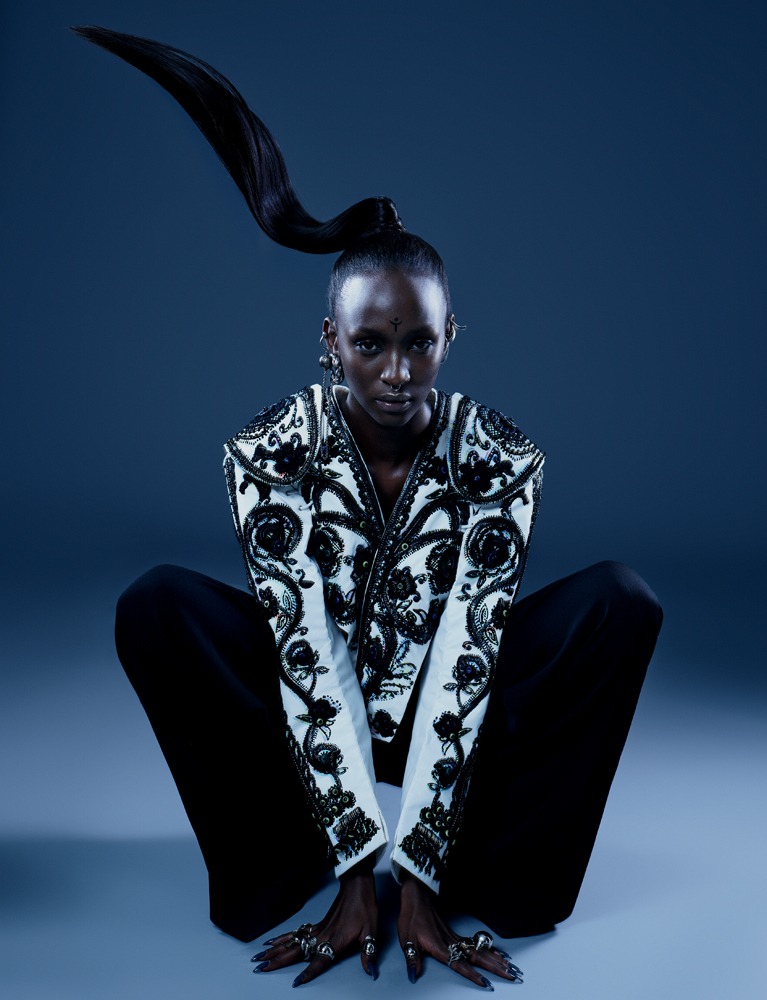
Who are the “Yakuzas” in Lous and the Yakuza?
The Yakuza are all the people who work with me in the wings, from my press attachés and choreographers to my producers. All these people deserve the limelight. Crediting them is the first step towards not getting too big-headed. That’s why they’re mentioned in my stage name. I didn’t want to forget that, without them, I wouldn’t amount to much. I’d be like a diamond in the rough in serious need of polishing.
That’s rather a lot of people in the team. Hasn’t your inner control freak ever wanted to make a break for freedom?
I don’t see myself at all in the cliché of the artist fighting with the record label over their vision. I get along very well with mine [Columbia Records]. They took a chance and decided to believe in a young Black woman whose songs don’t just talk about partying and forgetting your troubles. I talk about rape, prostitution, loneliness, colonialism. I didn’t expect their trust, and the investment of energy and cash they’re making to help me realize my ideas and vision is extraordinary.
And yet you talk about solitude in the very first lines of the album.
Because I am alone, now perhaps more than before. I’m travelling the whole time, every night in a hotel… The lifestyle the music business imposes on an artist has nothing to do with what I imagined. I guess I hadn’t realized there would be all these ob- ligations. The theme of solitude recurs often in my work, even if that wasn’t at all calculated on my part. The first track on the album, Dilemme, is the one that explains who I am, that retraces my history. I wanted it to be the first track because it’s my identity card, it allows the listener to know me better.
Who are the “Yakuzas” in Lous and the Yakuza?
The Yakuza are all the people who work with me in the wings, from my press attachés and choreographers to my producers. All these people deserve the limelight. Crediting them is the first step towards not getting too big-headed. That’s why they’re mentioned in my stage name. I didn’t want to forget that, without them, I wouldn’t amount to much. I’d be like a diamond in the rough in serious need of polishing.
That’s rather a lot of people in the team. Hasn’t your inner control freak ever wanted to make a break for freedom?
I don’t see myself at all in the cliché of the artist fighting with the record label over their vision. I get along very well with mine [Columbia Records]. They took a chance and decided to believe in a young Black woman whose songs don’t just talk about partying and forgetting your troubles. I talk about rape, prostitution, loneliness, colonialism. I didn’t expect their trust, and the investment of energy and cash they’re making to help me realize my ideas and vision is extraordinary.
And yet you talk about solitude in the very first lines of the album.
Because I am alone, now perhaps more than before. I’m travelling the whole time, every night in a hotel… The lifestyle the music business imposes on an artist has nothing to do with what I imagined. I guess I hadn’t realized there would be all these ob- ligations. The theme of solitude recurs often in my work, even if that wasn’t at all calculated on my part. The first track on the album, Dilemme, is the one that explains who I am, that retraces my history. I wanted it to be the first track because it’s my identity card, it allows the listener to know me better.
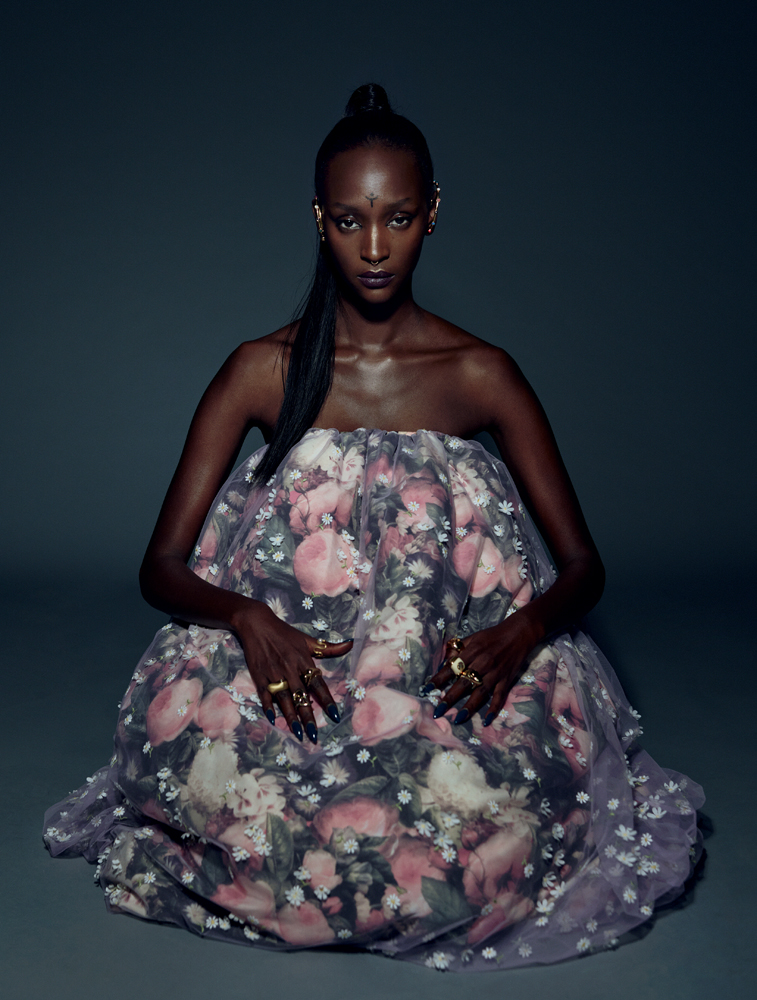
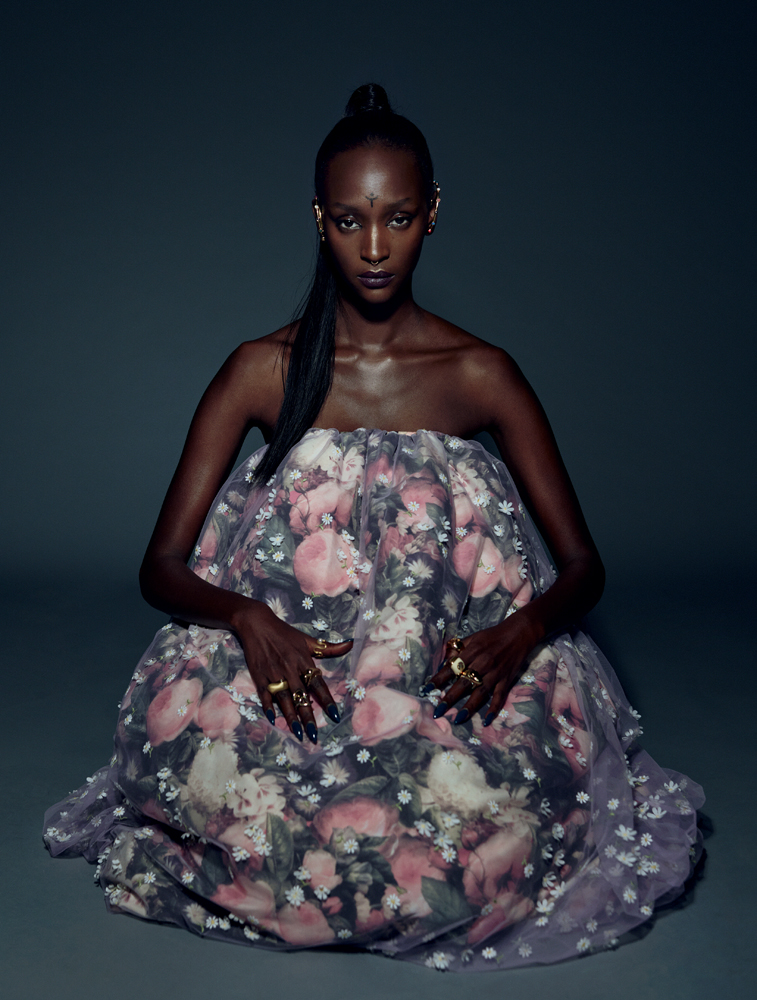
For this first album you worked with El Guincho, the producer who helped Rosalía achieve international fame. Was it you who approached him?
I’d already composed half the album before I tried to meet him. For me, he was the producer who would be able to realize my vision. He sees everything before everyone else – I don’t make any musical decisions without him. And we understood each other pretty quickly. I think that together we create music unlike any other. My team sometimes even has trouble getting us played on the radio because our sound doesn’t fall into established classifications.
The media and your fans tend to classify you as rapper, which you frequently deny.
People describe me their way, and to a certain extent I am what they think of me. If everyone agrees that I’m a rapper, well I become a rapper. The public decides who I am, at least where nomenclature is concerned. I just try to be as authentic as possible. My music is a constant and infinite quest for truth, and that belongs to no particular genre and all of them at the same time.
For this first album you worked with El Guincho, the producer who helped Rosalía achieve international fame. Was it you who approached him?
I’d already composed half the album before I tried to meet him. For me, he was the producer who would be able to realize my vision. He sees everything before everyone else – I don’t make any musical decisions without him. And we understood each other pretty quickly. I think that together we create music unlike any other. My team sometimes even has trouble getting us played on the radio because our sound doesn’t fall into established classifications.
The media and your fans tend to classify you as rapper, which you frequently deny.
People describe me their way, and to a certain extent I am what they think of me. If everyone agrees that I’m a rapper, well I become a rapper. The public decides who I am, at least where nomenclature is concerned. I just try to be as authentic as possible. My music is a constant and infinite quest for truth, and that belongs to no particular genre and all of them at the same time.
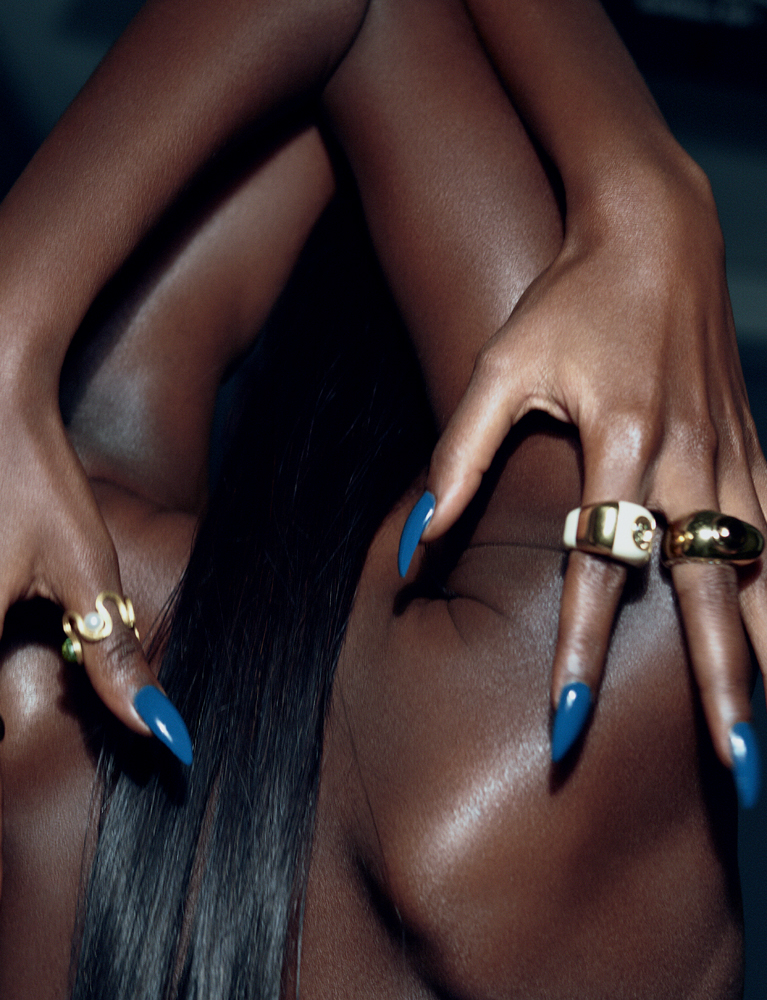
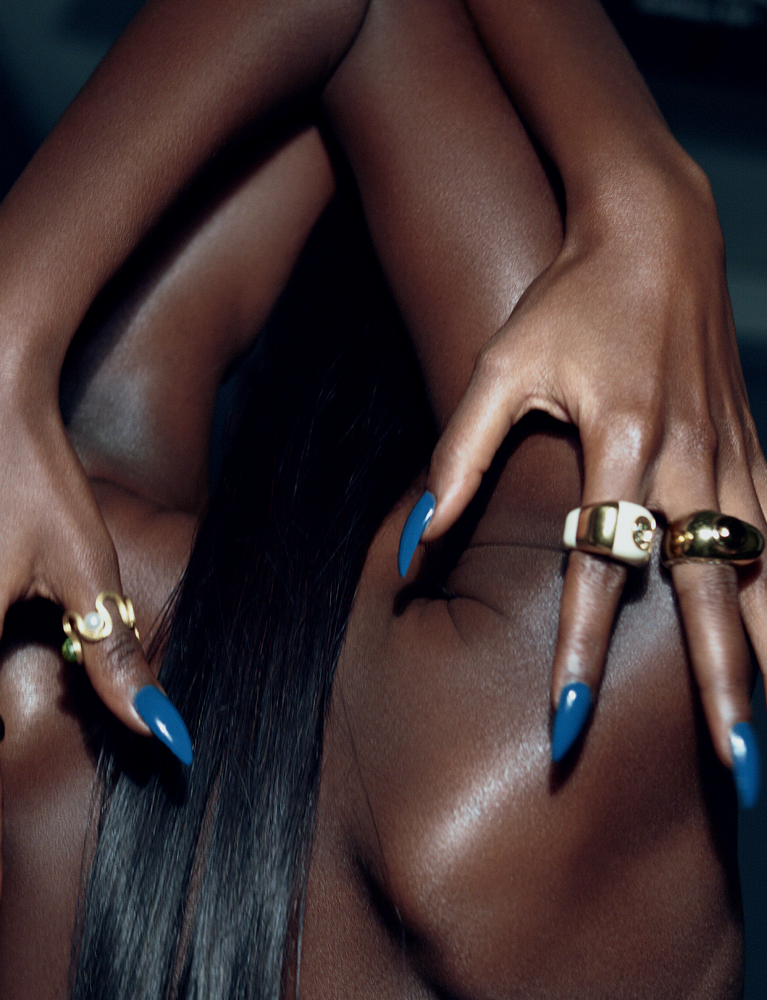
On the subject of rap, Damso recently celebrated the release of his latest album, QALF – on which you feature – in Kinshasa. Would you be tempted to do something similar?
That would be incredible! Damso did something I really admired: he brought his album out over there before releasing it in Europe to prove that Africa isn’t perpetually behind. Putting on an event in the Congo that garners worldwide attention is pretty extraordinary – it’s giving Africa the place it deserves, culturally. Africans are great influencers. Today, Afro-beat is everywhere, and people are falling over with admiration for African artists like Burna Boy or WizKid. But they’d already launched their careers over a decade ago – I was listening to them back when I was 15.
On the subject of rap, Damso recently celebrated the release of his latest album, QALF – on which you feature – in Kinshasa. Would you be tempted to do something similar?
That would be incredible! Damso did something I really admired: he brought his album out over there before releasing it in Europe to prove that Africa isn’t perpetually behind. Putting on an event in the Congo that garners worldwide attention is pretty extraordinary – it’s giving Africa the place it deserves, culturally. Africans are great influencers. Today, Afro-beat is everywhere, and people are falling over with admiration for African artists like Burna Boy or WizKid. But they’d already launched their careers over a decade ago – I was listening to them back when I was 15.
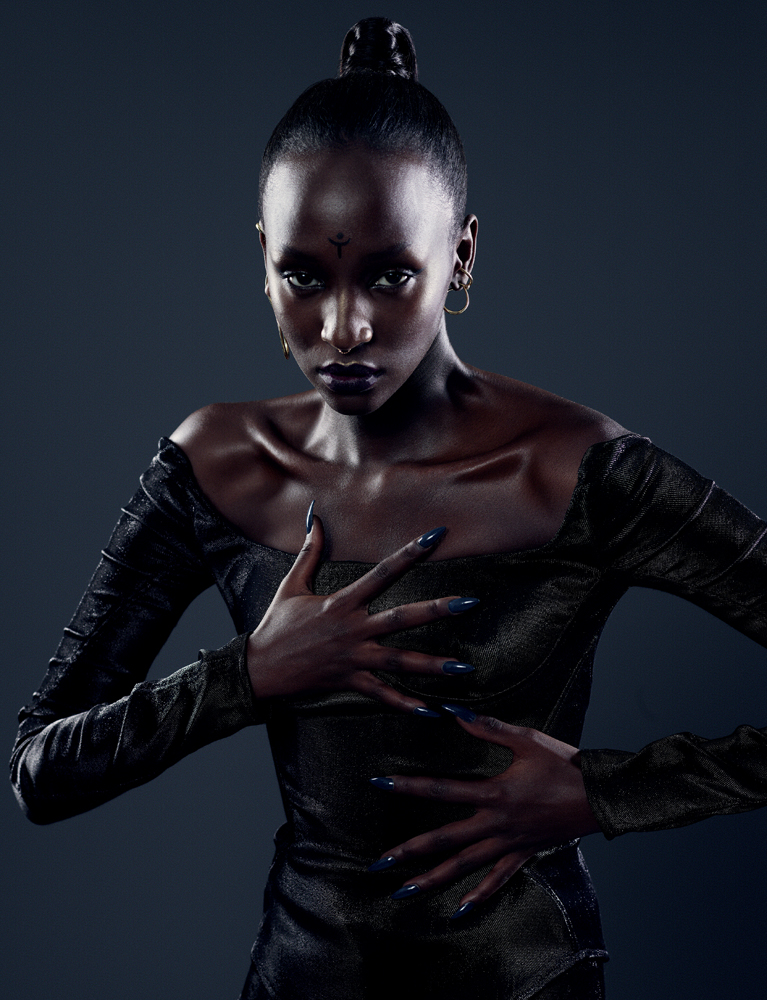
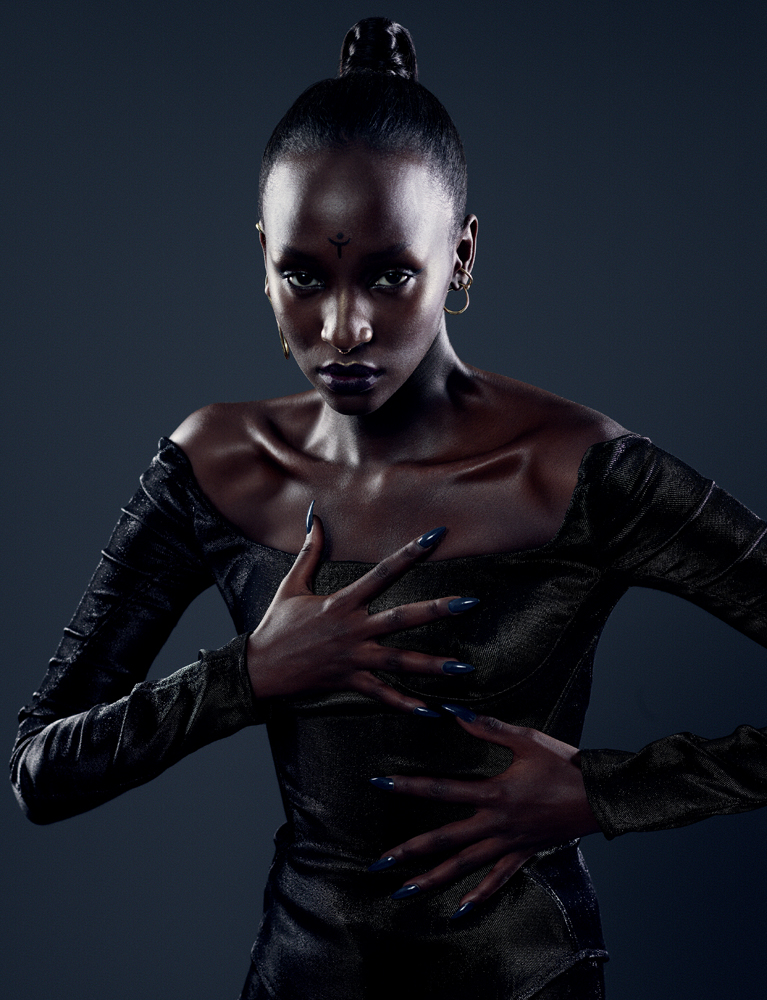
What place does the Congo have in your musical identity?
We were talking about aesthetics earlier… Well I would say that the relationship to style is intense with us! People from the Congo try to make sure we’re always styled, whatever the occasion – fashion is very important to us. For showing off, of course, but also because it’s about identity: showing your clothes is about showing your power. And then there’s dance. In the Congo, everyone dances from birth, it’s what we live for. It’s a huge manifestation of hope in our country, which has been at war since 1996. We can’t think about war the whole time, we need to find escape outlets.
What place does the Congo have in your musical identity?
We were talking about aesthetics earlier… Well I would say that the relationship to style is intense with us! People from the Congo try to make sure we’re always styled, whatever the occasion – fashion is very important to us. For showing off, of course, but also because it’s about identity: showing your clothes is about showing your power. And then there’s dance. In the Congo, everyone dances from birth, it’s what we live for. It’s a huge manifestation of hope in our country, which has been at war since 1996. We can’t think about war the whole time, we need to find escape outlets.
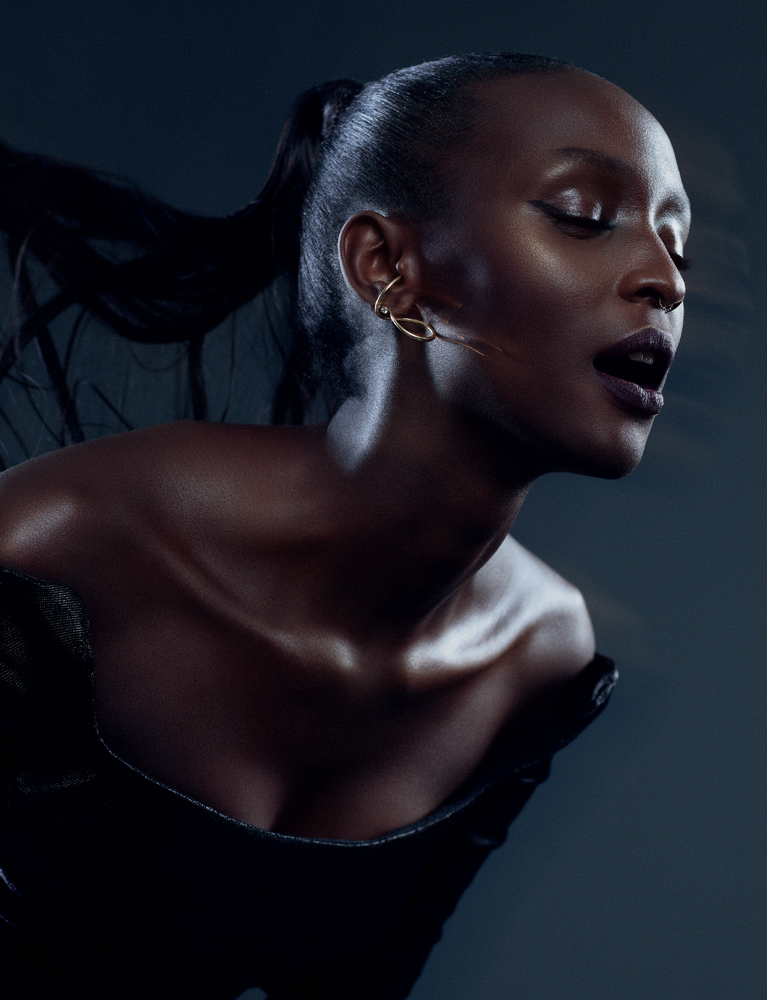

Do you already have a follow-up to Gore in mind? Or can a young artist allow herself time?
I’m going to start by releasing a few collaborations. When you decide you’re looking for quality, you can take your time. Gore was written three years ago – that left me the time to calculate and organize everything. In music, it’s all about strategy. If my first three singles were so different from each other, it’s be- cause I wanted to set the tone for my career to come. I’ve almost finished writing my second album, and it’s absolutely nothing like the first. I think it’s really going to disturb people. And it’ll be like that my whole life through – I’m too versatile, I’m a mix of too many cultures and influences, I’m in a state of constant experimentation. I hope people will never get used to my music!
Lous and the Yakuza, Gore (Columbia Records), out now.
Do you already have a follow-up to Gore in mind? Or can a young artist allow herself time?
I’m going to start by releasing a few collaborations. When you decide you’re looking for quality, you can take your time. Gore was written three years ago – that left me the time to calculate and organize everything. In music, it’s all about strategy. If my first three singles were so different from each other, it’s be- cause I wanted to set the tone for my career to come. I’ve almost finished writing my second album, and it’s absolutely nothing like the first. I think it’s really going to disturb people. And it’ll be like that my whole life through – I’m too versatile, I’m a mix of too many cultures and influences, I’m in a state of constant experimentation. I hope people will never get used to my music!
Lous and the Yakuza, Gore (Columbia Records), out now.


